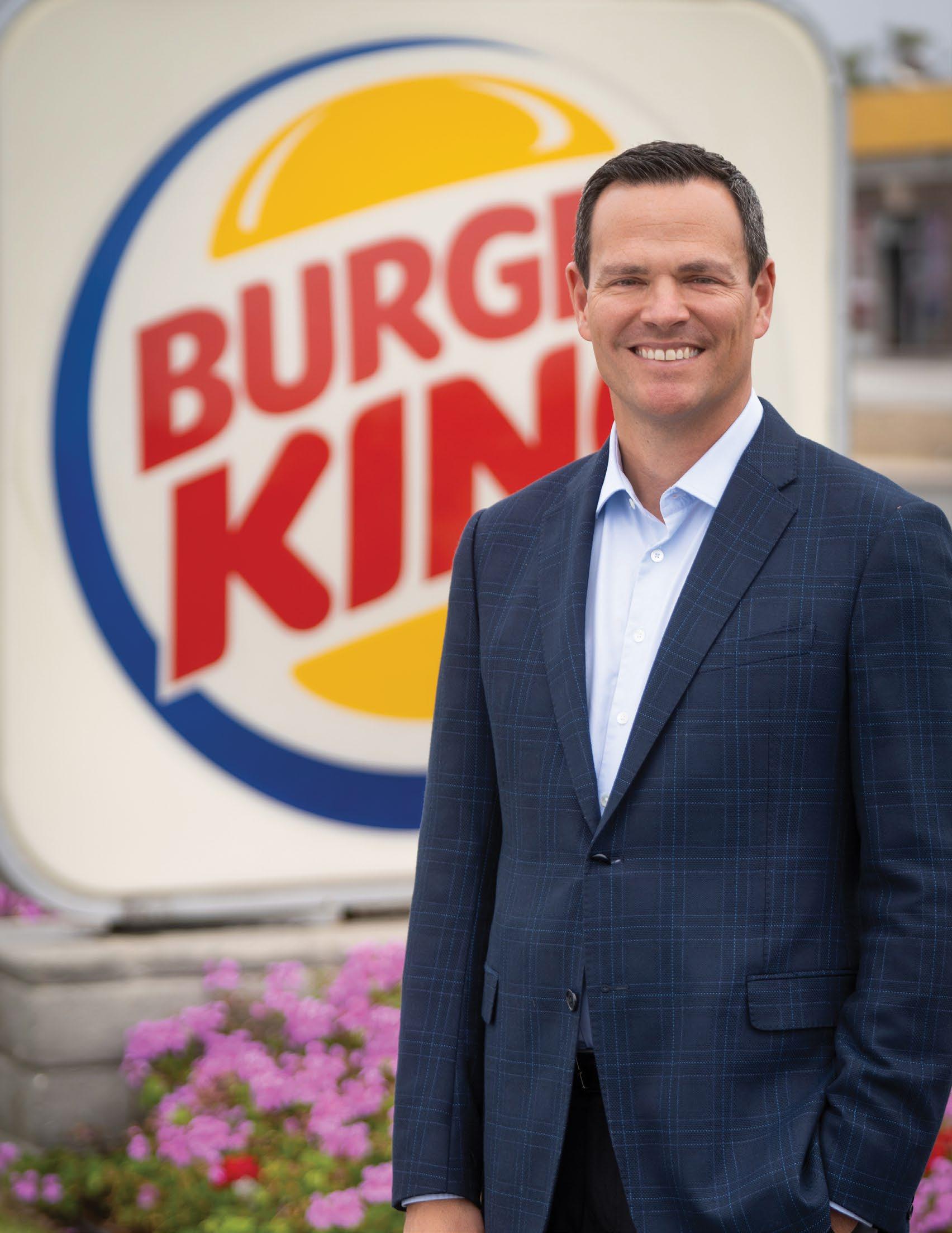

THE MAGAZINE OF THE NATIONAL FRANCHISEE ASSOCIATION, INC. www.nfabk.org 2021 Issue 3 More than just a business, BK is part of the DNA of second-generation franchisee Anthony Josephson Get to know new BURGER KING President of U.S. and Canada Tom Curtis PAGE 22 PAGE 16

Our dedicated franchise team eats, sleeps, and breathes franchised restaurant lending. We’re here for you, today and tomorrow. How may we serve you? New Stores . Remodels Acquisitions . Refinancing Real Estate . Equipment ppbifranchise.com 402.562.1800 LIKE YOUR FAVORITE CONDIMENT, WE MAKE LOANS A BIT MORE TASTY INGREDIENTS: KNOW-HOW, BUSINESS SAVVY, STRENGTH, RELIABILITY, QSR EXPERIENCE, FLEXIBLE LENDING fancy Ketchup
NFA Editorial Board
Matt Herridge
Executive Editor mherridge@charton.biz
304-865-2222
Sean Ireland
Editor-in-Chief seani@nfabk.org
Rachel Jackson Managing Editor rachelj@nfabk.org
Savannah Daly Associate Editor savannahd@nfabk.org
Advertising Sales
Jeff Reynolds Director of Business Partner Relations jeffr@nfabk.org
678-797-5163
NFA Officers
Dan Fitzpatrick Chair
Jim Froio
Vice Chair
Matt Herridge Secretary
Steve Keith Treasurer
Anthony Josephson
Second Vice President
Russ Lo Bello
Second Vice President
Andrew Schory
Second Vice President
Christy Williams
CEO
NFA Board of Directors
CANADIAN FRANCHISEE ASSOCIATION

Mike Kitchingman
FLORIDA/CARIBBEAN
Glenn Levins
GREAT MIDWEST
Adam Velarde
Matt Carpenter
Henry Delouvrier
GREAT WESTERN
Nasser Aliabadi
Gary Geiger
INTERNATIONAL HISPANIC FRANCHISEE ASSOCIATION
Guillermo Perales
LARGE FRANCHISEE GROUP
Patrick Sidhu
METRO NEW YORK
Amir Syed
MID-ATLANTIC
Gary Andrzejewski
MID SOUTH
Kevin Newell
Mike Callahan
Brent Northrop
Larry Stokes II
MINORITY FRANCHISEE ASSOCIATION
Camille Lee-Johnson
MOUNTAIN
Amir Allison
Shirley Humerian SOUTHWEST
Michael Laird OHIO
13 Spotlight on 117th Congress: Sen. Bill Hagerty (R-TN)
14 In Memoriam: Gloria ‘Gee’ Kostel
20 Network Standardization: The Lynchpin in Restaurants’ Ongoing Digital Renaissance contributed by Comcast Business
21 No Nonsense Franchise Expansion contributed by Northern Bank
22 Get to Know BURGER KING President of U.S. and Canada Tom Curtis
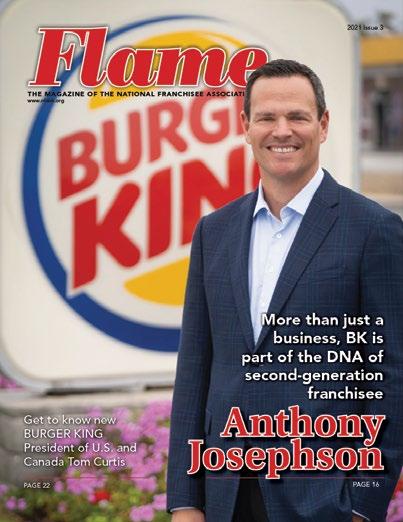
26 Transforming the Dining Experience contributed by Atmosphere TV
27 Advocate for Your Business at NFA’s Day on the Hill
28 A Clear Mission and Vision Provide Strong Foundation During Turbulent Times by Sean Ireland, NFA director of communications
31 Addressing the New Era of Staffing Shortages Through Employee Job Satisfaction contributed by Xenial
32 Labor Shortage Compounds Supply Chain Issues by Sean Ireland
36 NFA Members Host Congressmen During ‘Bring D.C. to Your BK’ Campaign by Savannah Daly, NFA communications coordinator
38 Elevanta Adds Retirement Program to Member Services Options by Sean Ireland
40 RSI Doubles Down on its Commitment to Partnership contributed by RSI
42 BURGER KING Family Fund: A Helping Hand in Times of Need contributed by BURGER KINGSM Foundation
44 Time’s Running Out: Plan Now for ASC 842 Lease Standard Compliance contributed by Leasecake
45 Meet With Attorneys From the Nation’s Top Franchise Law Firms at the 2021 CFA Legal Symposium
46 What a BOP Does and Doesn’t Cover contributed by Lockton Cos.
48 The Political Divide At Work: What To Do About It by Douglas H. Duerr, Elarbee Thompson Sapp and Wilson LLP
50 Influence People to Stay on the Path by Dan Coughlin, The Coughlin Co.
52 Everything Speaks About Your Business. What Does It Say? by Dennis Snow, Snow & Associates Inc.
54 Post-COVID-19 Productivity: Five Ways It’s Going to Improve Our Performance by Laura Stack, The Productivity Pro®
TABLE OF CONTENTS
2021 Issue 3
NEW ENGLAND Brek Kohler SOUTHERN CALIFORNIA
Timoney Andrew Schory Design and Layout KT Graphic Design ktgraphicdesign@gmail.com HEADQUARTERS 1701 Barrett Lakes Blvd. NW, Suite 180 Kennesaw, GA 30144 Phone: 678-797-5160 • Fax: 678-797-5170 www.nfabk.org The National Franchisee Association, Inc., comprising regional BURGER KING® franchisee associations, publishes the Flame. Any reproduction, in whole or in part, of the contents of this publication is prohibited without prior written consent of the National Franchisee Association, Inc. All Rights Reserved. In keeping with our commitment to the environment, this publication is printed on certified, environmentally friendly recycled paper using eco-friendly inks. Copyright ©2021 • Printed in the U.S.A. ON THE COVER Anthony Josephson steps into the Franchisee Spotlight. Read more on page 16. Columns 02 BK, NFA Leaders to Work Together on Difficult Business Issues by Dan Fitzpatrick, NFA chair 04 New Partnership Adds to Rich Menu of NFA Member Services by Christy Williams, CEO Departments 06 NFA Member News 10 Calendar of Events 10 Regional News 11 Legislative News 12 One Topic: 10 Facts 15 Franchisee to Franchisee Forum 16 Franchisee Spotlight 18 Look, Listen, Read Directories 08 Support the Vendors That Support Your Association 56 Editorial Calendar and Advertisers Guide
RIVER C.J.
Features
BK, NFA Leaders to Work Together on Difficult Business Issues
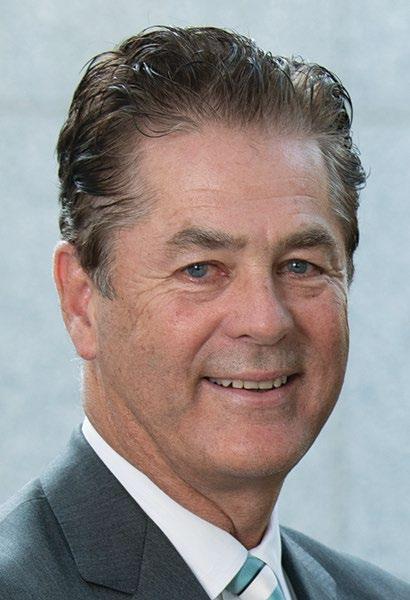
We do not need to be reminded of the challenging environment that our business and industry has faced over the last 20 months or so. Sometimes it feels like it has been 20 years, not 20 months.
Throughout this period, we have had a lot of downs and a few ups, and we have found a way to weather the storms. These challenges have manifested in many ways. Certainly, the business challenge is obvious, but the pressure, anguish and anxiety that have been felt by our families, our teams and our communities have been significant.
Earlier this spring, when we passed the one-year anniversary of the most dire aspects of the pandemic, we looked forward with an air of optimism and confidence that the worst was behind us and that better days lay ahead. Then, with seemingly no notice, COVID-19 decided to make a curtain call with the “delta variant.” The number of people affected by COVID-19 began to rise in certain localities quickly, and once again, we were playing defense, attempting to manage our businesses with difficulties seemingly on every front.
As we have made our way through the summer and are now observing the change of seasons into the fall and winter, we all feel the pressure on sales and the increasing pressure on margins. There can be no doubt that we face difficulties now, and that they are likely to remain with us into the foreseeable future.
It is in this context that I want our franchise community to know that the leadership of the NFA, and particularly our committee chairs and the NFA Board of Directors, has a soberly realistic view of where the system lies today and the issues that must be confronted and resolved.
Here is a brief list of items that are at the top of our collective to-do list: sales, restaurant-level cash flow, staffing, marketing and advertising, operational simplification, image issues, supply chain and distribution issues, hyperinflation, an overreaching and overzealous regulatory environment created by our government, and dysfunction in governmental bodies from Congress to local school boards, just to name a few.
At several recent regional franchisee association meetings, I shared that the challenges our brand faces are many, but that we did not get into this swamp in the last few months. It will likely take more than a few months to get us out of the swamp and back on the trajectory that we all desire. I want to clearly communicate that we are aware of the issues!
There is growing agreement between us and BK® management about the cause and core of the problems. Now over the next few months, we must resolve to take strong action to address the issues with concrete plans and an obsessive mindset about execution at every level for us to regain positive momentum.
I am confident that our committee chairs and their counterparts at BK, as well as the franchise committee members, are working diligently in a cooperative and professional spirit to build stronger plans to benefit our brand.
I hope by now many of you have had the opportunity to meet Tom Curtis, BK’s new president for North America and Canada. Tom has a wealth of experience in the restaurant business, which should benefit our brand. Jim Froio and I have met with Tom often in these last few months to discuss all the issues listed above and many more. We have a mutual understanding with Tom that the issues are not just important but carry with them a significant urgency
by DAN FITZPATRICK
to be addressed. Jim and I, on behalf of the NFA and all franchisees, have committed to work cooperatively with Tom and his team, as we have in the past, to spark a successful reenergizing of our business and the brand.



We have made clear to Tom that the success of our system is beyond just business success. The livelihoods and futures of our families are at stake. We are emotionally invested to ensure that we, as operators, do our part, and we are counting on him and his team to do theirs.
In December, we will gather in Las Vegas for our annual convention and the NFA annual meeting to review our business, to be with our vendor partners and to renew friendships and acquaintances with many. I hope until then we are all doing everything necessary to protect our business and that you and your teams will enjoy good health.
I look forward to seeing you all. n
2 | 2021 ISSUE 3
FROM THE CHAIR



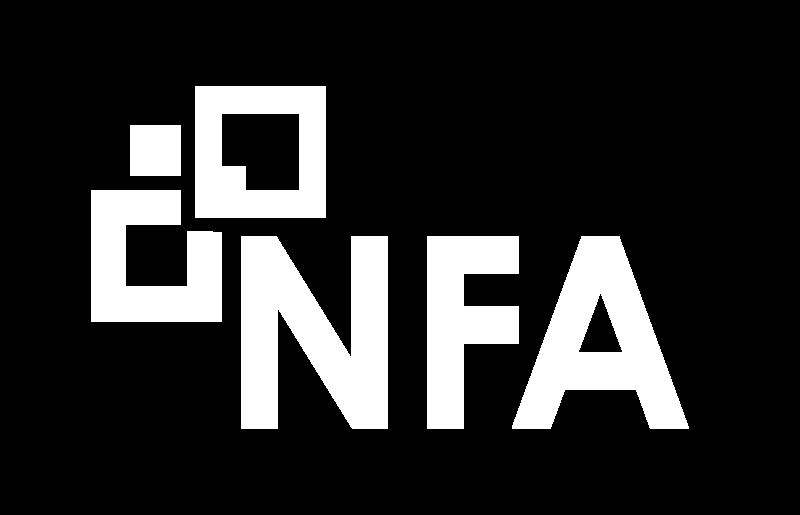

2022 NFA LEAD Conference June 7-10 | Cosmopolitan, Las Vegas WHO SHOULD ATTEND: Franchisees | ARLs | System Suppliers
New Partnership Adds to Rich Menu of NFA Member Services


Asyou know, the National Franchisee Association (NFA) was formed 33 years ago by franchisees concerned about the future of their BURGER KING® businesses as the corporate side of the business was being spun off by its owner.
Those franchisees knew that together they would have a stronger voice and more opportunity to control the factors that would determine the success of the BK® brand. Through the years, that has been proven true many times over. On many occasions, our united franchisee community has advocated for effective change and helped guide the evolution of the BK system to better outcomes for us all.
with companies like APPI Energy and Front Line Sales to offer programs that provide unique solutions for the specialized needs of our members at low costs.

The NFA has also developed programs to help with one of the biggest problems all business owners face today – finding and keeping great employees. You don’t need to look at job statistics to know that the usual difficulties keeping your restaurants fully staffed were only complicated by the coronavirus pandemic and subsequent government relief efforts over the past 18 months.
That’s why NFA programs that help BURGER KING operators stand out from the crowd are so important. NFA members have long had access to programs to help them better find, recruit and retain employees. With Traitset, franchisees have a partner helping to identify good candidates. By making behavioral assessments of potential team members and offering programs like Text to Apply, a simplified onboarding process and other features, this program helps managers navigate the difficult labor environment more smoothly than ever.
by CHRISTY WILLIAMS
One of the other benefits that the NFA has provided for members over time is a rich menu of association services that helps them lower costs and better manage their businesses. By the power of our association membership, the NFA has developed group health and property and casualty insurance programs specifically designed to meet the needs of hospitality businesses. We’ve also built relationships

Once those employees are on board, through the NFA partnership with rapid!, franchisees can use products like paycards to provide their team members with a convenient, no-cost alternative to paper checks that gives them quicker access to their earnings in a way that’s easier to use and spend. Employees appreciate this payment flexibility that’s not possible with a paper-based payroll system.
Now the NFA has a new program that provides members with an additional way to attract and keep employees. With Hall Financial Advisors LLC, we are introducing a Multiple Employer Aggregation Program (MEAP) that allows businesses
to develop customized 401(k) plans for their employees. This additional incentive is a direct response to the growing desire for benefits beyond salary that workers increasingly say they want. By providing this new incentive, you show your teams that you are just as invested in their success as individuals as you are in your business.

To learn more about any of these programs and how they can help you manage your business, please call us at 678-797-5160. The NFA staff will be pleased to help you explore them and the opportunities they can provide.
Our member services strike to the heart of the NFA’s mission – “To improve, preserve and ensure the economic success of all members.” For over three decades, this organization has been committed to that singular goal, and we are excited about the potential of this new member service to help us continue to achieve it. n
4 | 2021 ISSUE 3
THE CEO
FROM
On many occasions, our united franchisee community has advocated for effective change and helped guide the evolution of the BK system to better outcomes for us all.

Phoenix Organization Provides Meals to First Responders at Building Collapse
When a 12-story condo building near Miami, Florida, collapsed early on the morning of June 24, 98 people were killed and nearly 100 others injured.
First responders spent more than a month on the site, first in search-and-rescue operations, and later scouring the rubble for the remains of those unaccounted for who were thought to be in the building. In the heat of summer, it was exhausting, grueling work, and hundreds of people took part in the efforts.
The Phoenix Organization, a BURGER KING® franchise company based in Boca Raton with restaurants throughout south Florida, stepped up in the wake of the tragedy to do what it could for those working at the site. The company provided breakfast and lunch to the crews seven days a week and provided dinner four days a week.
“We knew the first responders would need to eat because it was going to be a long 24-hours-a-day rescue and recovery,” said

franchisee Russ Lo Bello. “We prepared the food in our restaurants and used chafing dishes to keep the food hot while we served it to everyone.”
Lo Bello said those working at the site, strained as they were from the difficult and stressful work, were still grateful. “They continually thanked us and were very happy to get hot meals after working to rescue or recover the individuals still in the rubble,” he said. The company’s efforts were also recognized beyond the site, with Mayor Daniella Levine Cava of MiamiDade County sending a letter of thanks to The Phoenix Organization and partners Lo Bello, Gary Levins, Glenn Levins and Rachel Levins.
For the partners and their teams, responding to their community in its time of need wasn’t something done for recognition. It was something they felt compelled to do.
“We at the Phoenix Organization are
so grateful to the people in the communities in which we do business and feel it’s only natural to give back to them during their time of need,” Lo Bello said. “If the businesses that operate in communities do not help in times of trouble, who else can? It is an honor and a privilege to feed all the individuals that gave up their time and energy to help out the people affected by this tragedy.” n
GPS Hospitality Seeks 3,000 Employees in Its Largest Nationwide Job Fair
GPS Hospitality, a fast-growing BURGER KING®, POPEYES®
Louisiana Kitchen and Pizza Hut franchisee, hosted its largest annual job fair on Sept. 14 with the goal of securing 3,000 new hires in one day. The nationwide fair took place at more than 475 GPS restaurants throughout 13 states with openings for 2,500 crew members, including Pizza Hut drivers and 500 managers to join the team immediately.
Hiring managers were on-site to meet with potential applicants and to conduct interviews from 9 a.m. to 9 p.m. No appointment was necessary, and qualified applicants could be hired on the spot.

In the past year alone, GPS Hospitality awarded more than $5.5 million in bonus dollars to its operations teams, including distribution of

appreciation bonuses due to COVID-19. Since 2018, the company also instituted annual vacation bonuses for full-time team members, as well as offering “Work Today, Get Paid Tomorrow” via a partnership with Instant Pay. The free program offers employees the opportunity to receive up to 50% of their pay the next day.
“Our restaurant teams are the front lines to our guests, the heart of our business,” said GPS Hospitality President Michael Lippert. “The ‘P’ in GPS signifies our people-oriented values, and the annual job fair allows us to engage with our communities to find current and future industry leaders.”
“Staffing continues to be GPS’ No. 1 priority as the industry faces unheralded challenges with hiring employees. It will

continue be a big focus for the company and its leaders in the months to come,” said Lisa Grier, director of communications.
“More than ever, we understand the importance of recognizing and retaining talent from crew members to shift leaders to managers,” said GPS Vice President of Human Resources Vickie Volan. “We are continuing to evolve and find new pathways of offering our leaders impactful ways to reward and advance employees within the company. In 2020, we announced the GPS Hospitality Partner Program, a deferred compensation program rewarding key team members who are committed to the company’s values and philosophy. These initiatives, along with other companywide benefits, are in direct response to the needs of our teams.” n
6 | 2021 ISSUE 3 MEMBER NEWS
Russ Lo Bello, left, and his team provided meals nearly around the clock to the emergency services personnel that worked at the site of the collapse of a condo tower near Miami, Florida.
Geiger Management Raises Thousands for Animal Shelters
Twenty-one BURGER KING® restaurants operated by Geiger Management in California, Idaho and Washington raised more than $25,000 for local animal shelters during a spring fundraising push.
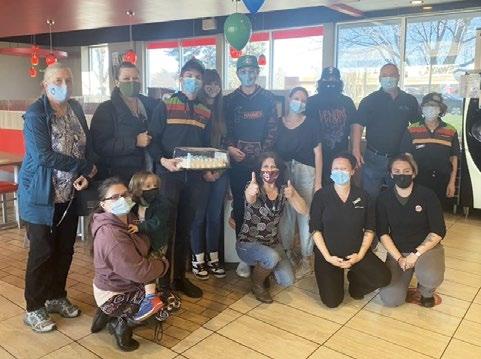
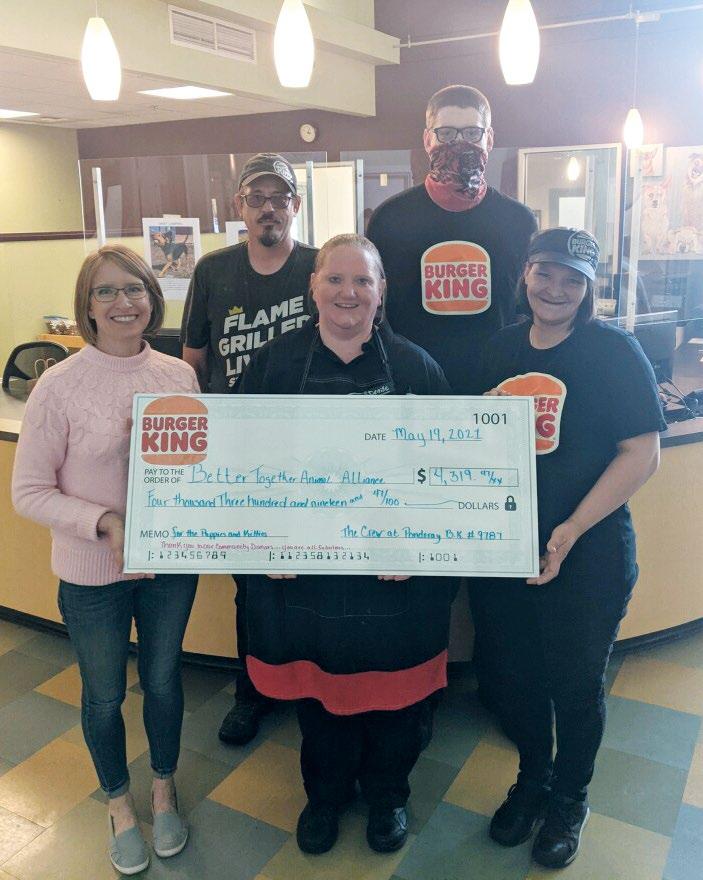
The stores participated in the event “Change for Change,” which served multiple purposes for the organizations involved, giving a financial boost to the shelters and demonstrating to Geiger Management team members the importance of community involvement. It also allowed the teams to practice new sales techniques that had been a focus of training since the start of the year.
“Starting in January, as an effort to improve employee morale amid the COVID-19 pandemic, we have been facilitating monthly contests for all our restaurants that incorporate some basic training as well as give everyone a chance to win prizes,” said Jennifer Reynolds, a member of the human resources team with the franchise company. “This fundraiser partnership idea was a contest as part of that program to help show our employees how important it is to have a good image in the local community. Community outreach is a two-way street. If you take care of the community, the community will take care of you.”
The teams at Geiger Management worked early in the year on their upselling techniques with specific products. The fundraiser was designed to help them take the concept to the next level to aid worthy community service organizations.
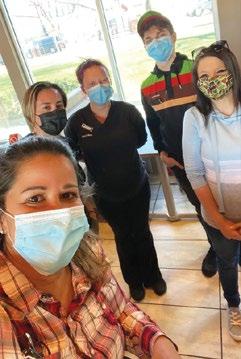
“We chose the specific focus of an animal shelter partnership for several reasons,” Reynolds said. “Raising money for animals is typically nonconfrontational in the eyes of the public. Animal shelters also have traditionally large social media followings and support groups that are passionate and act. And finally, the timing worked out great because we wanted to do this fundraiser during spring as animal shelters see an influx of puppies and kittens.”
Each restaurant was paired with a local shelter and had a goal to raise $500 for the shelter from April 1 to May 16. In total, the restaurants raised $25,762 and nearly every one of them topped its goal – a smashing success. Reynolds said Geiger Management hopes to make the effort an annual one and incorporate new elements, such as animal adoption events in the restaurant parking lots and supply drives.
“For us, it all comes back to training,” Reynolds said. “How else can an employee see our impact on the community if we don’t facilitate something like this? We saw
our employees take pride in the fundraising efforts, knowing they were making a big difference. And in return, the restaurant picked up a few extra sales, maybe an extra regular customer or two, and possibly recruited a new employee, all because we put ourselves out there and offered to do something good for the community. It’s a perfect win-win scenario!” n
Ocedon Honors Scholarship-Winning Team Member
B
URGER KING® franchise company


Ocedon recently hosted a celebration for a scholarship-winning team member.
Earlier this year, cashier Nicholas Barrieault was awarded a $5,000 Central Region Scholarship from the BURGER KING SM Foundation.
Barrieault has been an outstanding member of Ocedon’s BK® No. 9334 in Loveland, Colorado, for several years.

He is now attending Grand Canyon University in Phoenix, Arizona, where is he is studying biology with plans to become a dentist.
“The scholarship helped Nicholas tremendously and showcases that hard work pays off,” said Jennifer Oceguera of Ocedon.
“He and his family are very grateful.”
BK No. 9334 hosted a party and surprised Barrieault as he walked in for
the start of his shift to help him celebrate this scholarship award. His family attended as well. n

2021 ISSUE 3 | 7 MEMBER NEWS
Team members at Geiger Management’s No. 9787 BURGER KING restaurant present a check for over $4,000 to an official with the local animal shelter.
Ocedon’s Nicholas Barrieault was honored with a surprise party with family, friends and team members at his BURGER KING restaurant after he was awarded a $5,000 scholarship.
Support the Vendors
That Support Your Association



8 | 2021 ISSUE 3
Company Name Level Contact Name Email Phone Elevanta Health Partner Joseph Pieper josephp@nfabk.org 678-797-5160 Elevanta Payroll & Accounting Partner Stephanie Luke sluke@mizecpas.com 785-233-0536 x3022 Lockton Affinity Partner Reid Robson elevanta@locktonaffinity.com 844-403-4947 Keurig Dr Pepper Diamond Josh Hanley josh.hanley@dpsg.com 770-844-1597 The Coca-Cola Co. Ruby Susan Miller skmiller@coca-cola.com 404-852-5399 Welbilt Inc. Ruby Joan Salah joan.salah@welbilt.com 813-504-9262 Acrelec America Sapphire Paul Manganaro paul.manganaro@acrelec.com 412-537-6577 Atmosphere TV Sapphire Joey Martinez joey.martinez@atmosphere.tv 512-947-5789 Comcast Business Sapphire Marybeth Pearce marybeth_pearce@comcast.com n/a Cummings Signs Sapphire Dan Belling dan.belling@cummingssigns.com 615-872-5471 DTiQ Sapphire Alison Morey amorey@dtiq.com 800-933-8388 Envysion Inc. Sapphire Brian Waisman bwaisman@envysion.com 303-725-1751 Hall Financial Advisors Sapphire Angela Harkness angela.harkness@hallfa.com 866-865-4442 Integrated Cash Logistics Sapphire Chris Stanley chris.stanley@iclcash.com 412-906-0720 Lancer Worldwide Sapphire Greg Edwards greg.edwards@lancercorp.com 904-631-1031 Leasecake Inc. Sapphire Kristi Tilton kristi@leasecake.com 407-595-6056 Northern Bank and Trust Co. Sapphire Kelley Munsell kmunsell@nbtc.com 781-569-1584 rapid! Sapphire Edward Cole ecole@greendotcorp.com 813-340-3276 Restaurant Technologies Sapphire Ileana Barbara ibarbara@rti-inc.com 651-233-3042 Tapcheck Sapphire Ron Gaver ron.gaver@tapcheck.com 866-697-6016 The Hershey Co. Sapphire Kevin Austene kaustene@hersheys.com 630-724-7124 TraitSet Sapphire Dan Longton dan@hrgems.com 239-877-0110 Xenial Sapphire Samantha Young samantha.young@xenial.com 215-485-0292 Allen Industries Inc. Pearl Betsy Swan betsy.swan@allenindustries.com 336-615-8791 BlueTriton Brands, formerly Nestlé Waters North America Pearl Anitra Miller anitra.miller@waters.nestle.com 321-863-0944 Ecolab Pearl Al Powell al.powell@ecolab.com 816-206-2513 Global Building Contractors LLC Pearl Reece Milton r.milton@gbc.llc 865-640-7099 Gycor International Pearl David Rogers drogers@gycorfilters.com 800-772-0660 Mount Franklin Foods Pearl Linda Dorsett lindad@mountfranklinfoods.com 904-923-4053 Simplot Pearl Brad Glover brad.glover@simplot.com 704-907-6522 SKECHERS Pearl Harold Surabian haroldsu@skechers.com 310-318-3100 x1860 Tyson Foods Inc. Pearl Kathy Black kathy.black@tyson.com 410-340-3974 UPshow Pearl Scott Axonovitz scott@upshow.tv 419-261-1802 ACP Inc./Amana, an Ali Group Co. Assoc. Mbr. Chris Bartley cbartley@acpsolutions.com 319-899-6723 Amerex Assoc. Mbr. Jamie Knowles james.knowles@amerex-fire.com 205-810-9137 Antunes Assoc. Mbr. Olga Flores olga.flores@antunes.com 630-788-9623 Armor Security Assoc. Mbr. Michael Megraw michael@armoralarm.com 913-201-4959 Auxilior Capital Partners Assoc. Mbr. Steve Pattison spattison@auxcap.com 610-897-0153 Bank of Hope Assoc. Mbr. Robert Leon robert.leon@bankofhope.com 310-308-9749 Bimbo Bakeries Assoc. Mbr. Turner Creech turner.creech@grupobimbo.com 770-309-7551 C Squared Advisors LLC Assoc. Mbr. Peter DiFilippo pete@c2advisorygroup.com 401-525-6771 Casablanca Design Group Assoc. Mbr. John Harrison john.harrison@casablancadesign.com 770-337-0931 Checkwriters Assoc. Mbr. Jake Hebert jake.hebert@checkwriters.com 888-243-2555 DAR PRO Solutions Assoc. Mbr. Dave Van Dorselaer dvandorselaer@darpro.com 832-221-1630 DMI Manufacturing Inc. Assoc. Mbr. Denise Bangasser denise@dmiparts.com 800-238-5384 Duke Manufacturing Assoc. Mbr. Rick Garriga rgarriga@dukemfg.com 305-270-6242 Endera Assoc. Mbr. Bill Petrocco bpetrocco@endera.com 201-208-3772 Facility Concepts Inc. Assoc. Mbr. Kenneth Weaver kweaver@fcius.com 800-915-8890 FCC Commercial Furniture Assoc. Mbr. Russ Cooley russ.cooley@fccfurn.com 541-580-3192 Filtercorp Inc. Assoc. Mbr. Brian Bonham bbonham@filtercorp.com 720-329-3816 First Horizon Bank, Restaurant Finance Assoc. Mbr. Thomas Hung thung@firsthorizon.com 480-375-9907 Franke Foodservice Systems Assoc. Mbr. John Edmonds john.edmonds@franke.com 615-462-4191 Frozen Beverage Dispensers Assoc. Mbr. Joe Clements jclements@fbdfrozen.com 214-732-9555 Future Energy Solutions Assoc. Mbr. Wayne Burrell wayneburrell@feslighting.com 561-445-0892 G4S Retail Solutions (USA) Inc. Assoc. Mbr. James Hester james.hester@usa.g4s.com 504-491-6291 Global HR Research Assoc. Mbr. Russ Blitz rblitz@ghrr.com 205-879-0143 Greenlink Payroll Assoc. Mbr. Brett McEvoy b.mcevoy@greenlinkpayroll.com 480-546-6272 HME Assoc. Mbr. Stephen Lee slee@hme.com 858-848-3704 Hoshizaki America Inc. Assoc. Mbr. Bret Eldridge beldridge@hoshizaki.com 678-907-6922 Impossible Foods Inc. Assoc. Mbr. Hannah Riddle hannah.riddle@impossiblefoods.com 339-832-8837






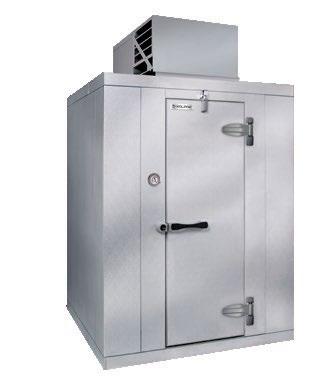


2021 ISSUE 3 | 9 Purchase a Frymaster ® FQ4000 Touchscreen Fryer free subscription to KitchenConnect® during the warranty period USE DATA TO INCREASE FRYER PROFITABILITY welbilt.com Joan Salah | joan.salah@welbilt.com | 813.504.9262 Call for more details SUPPLIER FOR OVER 40 YEARS Company Name Level Contact Name Email Phone InSite Real Estate LLC Assoc. Mbr. Tom Kostelny tkostelny@insiterealestate.com 630-617-9155 Jolt Assoc. Mbr. Pete Cavanaugh pete.cavanaugh@jolt.com 877-396-4112 Koala Kare, a division of Bobrick Washroom Equipment Assoc. Mbr. Beth Gardner bgardner@bobrick.com 904-310-8707 Loomis Assoc. Mbr. Tom Simon tom.simon@us.loomis.com 602-619-9886 Mahoney Environmental Assoc. Mbr. James Fisher jfisher@mahoneyes.com 815-341-3882 Marmon Foodservice Technologies Assoc. Mbr. Steve Campbell steve.campbell@marmonfoodservice.com 612-219-8492 National Franchise Sales Assoc. Mbr. Mike Deegan md@nationalfranchisesales.com 949-428-0492 NCA Consultants Assoc. Mbr. Linda Snyder lsnyder@ncaconsultants.com 727-530-0078 Nieco Corp. Assoc. Mbr. Jaime Nau jnau@nieco.com 707-284-7100 One More Time Assoc. Mbr. Alex Alvarez aalvarez@onemoretimeinc.com 323-839-8541 Pacific Premier Franchise Capital Assoc. Mbr. Sharon Soltero ssoltero@ppbifranchise.com 402-562-1801 Parts Town Assoc. Mbr. Craig Drummond cdrummond@partstown.com 717-763-0508 PrepWizard Assoc. Mbr. Cole Harris cole@prep-wizard.com 888-993-7737 Revenue Management Solutions Assoc. Mbr. Chris Norton cnorton@revenuemanage.com 813-386-5005 RiskLimiter by Gleason Technology Assoc. Mbr. Shane Morris shane.morris@gleasontech.com 814-242-2534 RoofingSource Assoc. Mbr. Tom Dawson tom.dawson@roofingsource.com 407-592-8363 SabreTooth Technologies Assoc. Mbr. Patti Kratz patti@sabretoothtechnologies.com 336-340-1196 Samsung Electronics America Assoc. Mbr. Samantha Verrier sverrier@sea.samsung.com 201-446-0369 Seating Concepts Assoc. Mbr. Ken Hibben khibben@seating-concepts.com 815-483-2253 Solink Assoc. Mbr. Kassam Karim kkarim@solink.com 651-214-3340 Spray Master Technologies Assoc. Mbr. Barry Healey bhealey@spraymastertech.com 479-366-4471 Taylor Ultimate Services Co. Assoc. Mbr. Raul Piedra III raul@taylorus.com 954-217-9100 Tucker Safety Products Assoc. Mbr. Mark Beckman mark@tuckersafety.com 719-527-4848 TundraFMP Assoc. Mbr. Thomas L. Martin tmartin@tundrafmp.com 704-962-0751 Valley Proteins Assoc. Mbr. Ron Rogers rrogers@valleyproteins.com 540-877-3220 Vericast Assoc. Mbr. Amy Sanders aesander@valassis.com 954-805-3563 Veterans of Foreign Wars Foundation (VFW) Assoc. Mbr. Kevin Jamison kjamison@vfw.org 816-968-1175 Workstream Assoc. Mbr. Chris Horton chris@workstream.is 801-854-0202 Zen Ecosystems Assoc. Mbr. Rachel Israel rachel.israel@zenecosystems.com 949-359-8208 Zenput Assoc. Mbr. Marcela Ganem marcela@zenput.com 678-905-8576
ORC Holds Successful Regional Meeting in Columbus, Ohio
On Aug. 30-31, the Ohio River Coalition (ORC) met face-to-face for the first time since the start of the COVID-19 pandemic for its regional meeting at the Embassy Suites Columbus Airport in Ohio.

Spearheaded by Regional Chair Andrew Schory, this two-day meeting provided a jam-packed agenda filled with insightful topics and knowledgeable speakers as well as networking opportunities with other franchisees in the region and an exhibit hall full of the vendor suppliers and partners.

The regional meeting kicked off on Monday, Aug. 30, with a vendor reception in the exhibit hall followed by a dinner buffet for all attendees. The following day started bright and early at 7 a.m. with a breakfast in the exhibit hall with general session starting shortly after.
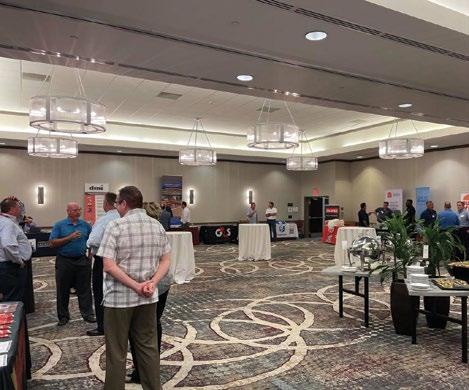
Regional Events
Nov. 10
Southern California Burger King Franchise Association Meeting
Los Angeles, California
Jan. 9-11, 2022
Mid South Franchisee Association Regional Meeting
New Orleans, Louisiana
Schory opened the meeting with a welcome that was followed by a Restaurant Services Inc. (RSI) update by Joel Neikirk. Tom Curtis, BURGER KING®’s new president of U.S. and Canada, was welcomed to the stage alongside BK® Vice President of Franchise Operations Katerina Glyptis.
Neikirk’s educational presentation touched on sales, traffic and gross margin trends as well as a P&L update, sustainability update and updates on chicken costs and current supply/distribution challenges. Curtis informed the meeting attendees about calendar updates and Royal Perks Loyalty as well as profitability interventions in the short term. Glyptis spoke on the Franchise Success System and briefly mentioned the upcoming roadshows, market-specific meetings and BKC convention in Las Vegas in December.
National Events


Nov. 17-18
RSI Board Meeting
Miami, Florida
Nov. 30-Dec. 1
Elevanta Board Meeting
Atlanta, Georgia
After the presentations from BKC, National Franchisee Association (NFA) Chair Dan Fitzpatrick was invited to the stage. Jim Froio, head of the NFA Marketing Council, provided a council update, and Matt Carpenter of TOMS King LLC was welcomed as a guest speaker before the meeting adjourned for lunch. After lunch, virtual presentations were made by Xenial representative Michael Schwartz and NFA Vice President of Legislative Affairs Misty Chally alongside Dominic Flis, vice chair of the NFA Government Relations Committee.
In a touching ceremony, an award was given to previous ORC Chair Bill Keller for all the dedication and time he provided to the regional association.
The ORC thanked Xenial and Leasecake for sponsoring its regional meeting. n
Dec. 6
NFA Board Meeting
Las Vegas, Nevada
Dec. 7-9
BK North America Convention
Las Vegas, Nevada
Dec. 9
NFA Annual Meeting
Las Vegas, Nevada

10 | 2021 ISSUE 3
REGIONAL NEWS
calendar
ORC Chair Andrew Schory kicks off the regional meeting.
Previous ORC Chair Bill Keller accepts an award for his time and dedication to the ORC.
Franchisees network with vendors at the tabletop trade show.
GRC Meets With Members of Congress on Key Issues
The National Franchisee Association’s Government Relations Committee (GRC) recently had its first in-person Washington, D.C., meeting since the start of the coronavirus pandemic, allowing the committee to connect with high-ranking members of Congress.
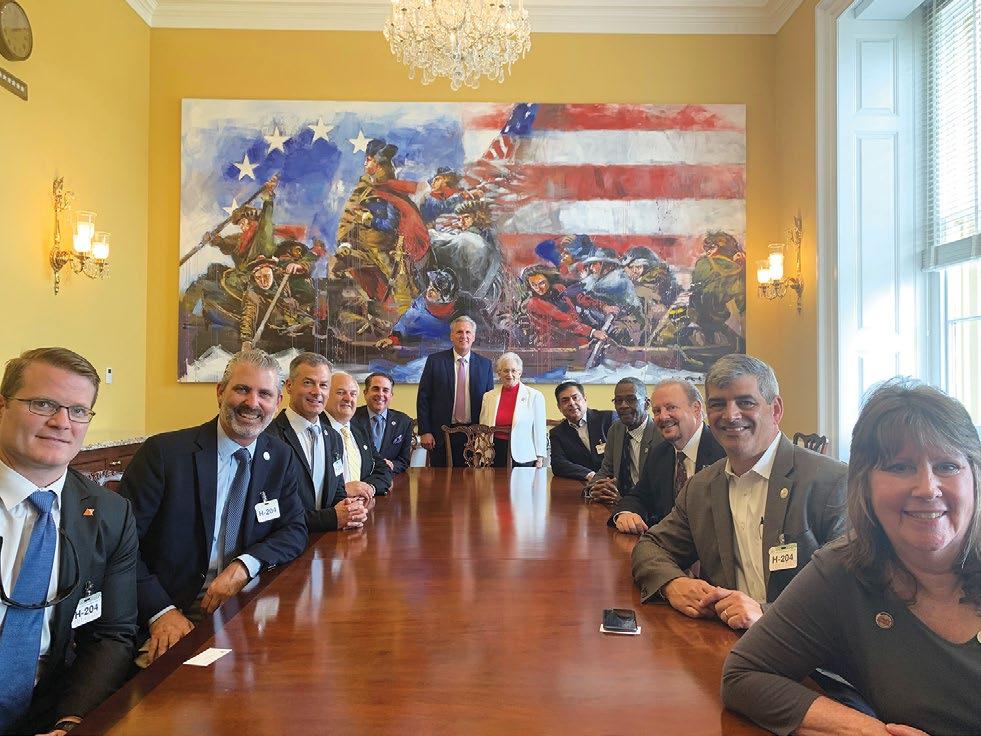



The GRC focused on transportation, labor and tax issues in multiple meetings across three days in late July with several senators and representatives.
• Transportation: Committee members emphasized support for the Drive Safe Act, which would allow drivers aged 18 to 21 with commercial driver’s licenses to transport goods across state lines, a practice currently prohibited by federal law. The act provides a safe, logical solution to the truck driver shortage and would ease problems getting items to BURGER KING® restaurants on time.
Additionally, the GRC expressed opposition to any provisions in transportation bills that would allow electric vehicle-charging stations on interstate rest areas, which could lead to rest stop commercialization.
• Labor: The committee also opposed proposals for the extension of extra federal unemployment benefits beyond the Sept. 6 deadline for those who suffered pandemic-related job losses. The NFA supports legislation with return-to-work incentives such as funding for hiring bonuses and expanded tax credits for employers.

The GRC focused on transportation, labor and tax issues in multiple meetings across three days in late July with several senators and representatives.
• Finally, the GRC opposed revenue-raising provisions of President Joe Biden’s American Jobs and Made in America Tax Plan, which would increase the corporate tax rate from 21% to 28% as well as increase the individual income tax rate for pass-through
entities and boost other tax rates. Additionally, committee members offered support for the Main Street Tax Certainty Act, which makes permanent the Section 199A 20% deduction for qualified business income, and the Death Tax Repeal Act, which permanently repeals certain taxes triggered upon the sale of a decedent’s estate. GRC members also expressed opposition to any efforts to repeal the stepping-up basis for capital gains taxes when property is inherited.
The GRC asked legislators to support the Restaurant Revitalization Fund Replenishment Act, which would provide additional recovery dollars for the restaurant industry. As part of the American Rescue Plan, the initial Restaurant
Revitalization Fund provided $28.6 billion in funding to businesses with less than 20 locations.
Among the members of Congress that met with the GRC were House Minority Leader Kevin McCarthy, House Minority Whip Steve Scalise, House Ways and Means Committee Ranking Member Kevin Brady, Sen. Steve Daines, Sen. Todd Young, Rep. Virginia Foxx, Rep. Mary Miller and Problem-Solvers Caucus Chairman Rep. Josh Gottheimer. This was in addition to several visits to legislative offices. GRC members also hosted a fundraiser attended by the National Restaurant Association, the International Franchise Association, NFIB and others that raised over $25,000 for Rep. Henry Cuellar. n
2021 ISSUE 3 | 11 LEGISLATIVE NEWS
The NFA Government Relations Committee met with House Minority Leader Kevin McCarthy and Rep. Virginia Foxx during its July meeting in Washington, D.C.
Ed Braddy, from left, Sen. Joe Manchin of West Virginia, Matt Herridge and Wyatt Batchelor met at the Capitol as part of the GRC meeting.
Restaurant Industry Labor Challenges
One topic: 10 facts
Evolution of the Customer Experience
How have customers’ expectations changed since the onset of the COVID-19 pandemic?
1Customer experience is a customer’s perception of how a company treats them. These perceptions affect their behaviors and build memories and feelings to drive their loyalty.
2 Three-fourths of consumers will leave a brand behind after three or fewer poor experiences.
3Positive customer experiences are less impactful on loyalty, with only 44% of consumers saying they were more likely to purchase from a brand again if they had a positive customer service experience.
4 Sixty percent of consumers say the pandemic has changed the way they buy goods and services.
5 In a May survey conducted by Revenue Management Solutions, 58% of respondents still expect to use a physical menu (disposable or not) when dining out.
Sources: Revenue Management Solutions, Nation’s Restaurant News, Retail Dive


6 Experience has been a strong driver for guests when returning to dine-in. Six out of 10 respondents said they missed the experience of dining out at restaurants during the pandemic.
7However, most respondents ran into one or more of the following snags when dining out: limited operating hours, limited menus and long wait times.
8 Longer than usual wait times have the greatest impact on respondents’ likelihood to return to restaurants with only 67% of consumers saying they would return based on wait times.
9 Seventy-nine percent of those who experienced disruptions would return.
10 According to Black Box Guest Intelligence™, over 50% of reviews and social media posts that were based on restaurant “service” were classified as positive during July 2021, an improvement of 4.8 percentage points in positive sentiment over two years.
12 | 2021 ISSUE 3
ISSUE
Spotlight on the 117th Congress: Sen. Bill Hagerty (R-TN)
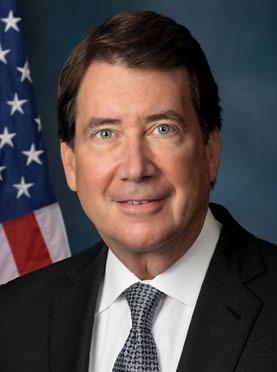
QWhat skills or perspectives from your background in private business do you apply as a public official?
AGrowing up from humble means in a small town in Tennessee, I learned the value of a job from a young age. I saw it in my own family: A good-paying job provides a sense of purpose and ameliorates a lot of other problems a family may encounter. I’ve lived my American dream, and I’m committed to preserving it for future generations. As a lifelong businessman, I’ve seen firsthand how bad federal government policy can have a destructive impact on workers and businesses. As a senator, my background and experience will enable me as I strive to open opportunities that will create goodpaying and fulfilling careers for American workers and enable every Tennessean to pursue his or her own American dream.
QHow did your work as commissioner of the Tennessee Department of Economic and Community Development affect your opinion on the role of government in private business?
AWhen Gov. Haslam recruited me to serve as Tennessee’s commissioner of economic and community development, I felt called to serve my state. When I started, Tennessee’s unemployment rate was near 10%, and we were one of the lowest-performing states in the country for job growth and education. We needed a new approach. I started out by significantly cutting the size of my department, eliminating over 40% of the positions and saving Tennessee taxpayers millions of dollars on a recurring basis. Then I restructured into a regional structure with my team working across the state with local leaders to grow opportunity and enhance our favorable business environment. After four years on the job, Tennessee led the nation in jobs created through foreign direct investments, we had cut our unemployment by nearly one-third, and we were named the top state in the nation for economic development an unprecedented two years in a row during my tenure. During my time as commissioner, I saw time and time again that job and wage growth don’t happen because of the government, they come from the people through grit, ingenuity and hard work. I determined that we in government could make a lasting difference in people’s lives, not by expanding the government, but by setting the right policies to create an environment that attracts dependable private-sector job creators.
QWhat do you see as the current biggest threat to small-business owners?
ADemocrats’ $3.5 trillion tax-and-spend spree that is currently being debated in Congress will be a devastating blow to small-business owners and American workers. It will worsen already record-high inflation (which is a hidden tax on everyday Americans

and is especially harmful to our American seniors and retirees); it will slow job creation and productivity; it will prompt companies to ship jobs overseas, thus hurting American communities; and, as currently written, it contains a mass amnesty proposal that will have a negative impact on wages for American workers.

QWhat challenges have you helped small businesses in Tennessee overcome?
AFor countless Tennesseans, the arts are more than simply hobbies – they’re a way of life. The COVID-19 pandemic brought much of Tennessee’s entertainment industry to a screeching halt, affecting the lives and livelihoods of workers across the state. Congress passed critical relief funds on a bipartisan basis in December of 2020, but unfortunately, getting aid to struggling small businesses was unhurried. Knowing that prominent Tennessee entertainment companies were some of the longest-suffering due to the shutdowns, many would be closing their doors for good without further access to the assistance that had been legislated before my arrival in the Senate. Since my arrival, I have continuously pushed the Small Business Administration to implement and expedite the Shuttered Venues Operating Grant program to assist all eligible Tennesseans seeking relief. Talking with small-business owners, farmers and employees during my first Economic Development tour last month was extremely helpful to better understand the challenges they are facing today, primarily rising inflation and bad federal policies that have disincentivized work. These conversations have informed what I must do in Washington, D.C., to make certain that we are crafting federal policy that enhances, rather than impedes, the success of our small businesses and workers. That starts with doing everything in my power to fight the Democrats’ $3.5 trillion tax-and-spending package.
QHow have your roles on the Committee on Banking, Housing and Urban Affairs and Committee on Appropriations influenced your opinions on the impact of legislation on small business?
AMany challenges faced by businesses and legislation that affects them come before these committees that touch almost every sector of our economy. As a member, I have a front row seat to how government spending and regulations impact American job creators. My role has given me the opportunity to be an advocate for the small businesses in my state and to ensure that the programs designed to help them – such as those within the Small Business Administration and the Departments of Commerce and Treasury – are supportive of job creators, not more burdensome. I will never take lightly the responsibilities I’ve been given on these committees, and it’s my greatest hope and ambition to utilize my positions to ensure government never handicaps the growth of small businesses but is conducive to their success. n

2021 ISSUE 3 | 13
Gloria ‘Gee’ Kostel
Gloria “Gee” Kostel, a longtime BURGER KING® franchisee based in Dallas, Texas, died July 10. Kostel and her husband, Richard, were partners in Kostel Inc., which currently operates four BURGER KING restaurants in Texas.
The Kostels, who were married for more than 53 years, moved to Texas from Chicago to become BK® franchisees in 1978. Richard Kostel was a Chicago policeman, and through connections made in the police academy, he learned about an opportunity to become a franchisee with BURGER KING. “We contacted Burger King Corp. and started our application,” said Richard Kostel. “I was still a police officer, and she was a housewife raising our three children, Deanne, John and Amy. After we applied, she went to our local BURGER KING and got an hourly job to get firsthand experience.”

From there, the family moved to Texas, where the Kostels’ dedication and hard work were rewarded. “We opened our first store in Paris, Texas, in 1978, and we built the company to 13 locations,” he said. “We’ve been downsizing and currently have four.” The Kostels’ son, John, is now directing operations at the company.
Gloria Kostel was involved in restaurant operations and designed building devices and furnishings as their business grew. She travelled extensively with her husband during his 22 years on the board of directors of RSI. Kostel was one of the organization’s founding directors.

“I knew her for about 20 years, starting when I first became a vice president for the South Central Desert Division in Dallas,” said Jim Myers, recently retired as the head of franchise business and operations


North America for Burger King Corp.
“Gee was the matriarch of the family, and she was always at events with her husband. She was a delightful lady. Everyone knew who they were.
“They were very high on the brand and participated in all the events. Rich was integral in working with RSI, and I remember how hard he worked on the RSI board,” Myers added. “When I moved to the Southwest region, he and Gee were the first to welcome me and offer help, and I will always be appreciative of them for that.”
Richard Kostel gives much credit to his wife for their success. “Everything she did in family and business she did excellently,” he said.
“She was always very supportive of Rich and their son, John. It was a very tightly knit family and family business,” Myers added.
Mrs. Kostel was also a gifted seamstress, an excellent cook, a beautiful interior designer and the ultimate hostess. She loved Christmas and was an amazing gift giver, her family noted.
“She was a great partner,” Richard Kostel said. “She was all that I could have asked for, and I loved every minute of it.”
Mrs. Kostel was preceded in death by her parents and two siblings. Survivors are her husband, her children, including Deanne Hinson, John Kostel and wife, Tory, Amy Kostel and husband, Matthew, and grandchildren Madison Kostel, Morgan Hinson, Paige Teer, Mason Hinson, McKenzie Kostel, Elliot White, Charlie White, Ethan Novotny and Rylie Novotny.
Memorials in her name may be made to the charity of your choice. n
14 | 2021 ISSUE 3 IN MEMORIAM
Richard and Gloria Kostel moved from Chicago to Texas to begin their BK journey.
The COVID-19 pandemic has changed customers’ expectations when it comes to dining out. In what ways have you seen this in your restaurants and how has your team adapted?
The pandemic seems to have made systemic changes to the quick-service restaurant industry that will continue to affect franchisees, team members and guests going forward. First and foremost is the reset of the labor market. The pool of employees has shrunk significantly. In our restaurants this has necessitated wage increases, bonuses and shortened hours of operation. We have struggled to open our dining rooms again due to a labor shortage. A general positive has been the willingness of guests to not only show patience but even appreciation for our teams, who are doing their best in a very difficult situation. Most impressive to me has been our management team, who continues to maintain a positive attitude and work extra hours, all while dealing with daily unexpected stressors. - Matt
Herridge
Ithink the American consumer base has largely fractured into two groups. On one side, there are customers who are understanding and kind because they know what everyone out there in retail is dealing with regarding staffing levels. Even if their experience isn’t 100% like it should be, they are grateful for us for being open the hours we are able and wait patiently when they may not get through as quickly as normal.

The flip side to this is the customer who feels like the world should be back to normal and everybody should be fully staffed and open for regular operating hours. This customer doesn’t understand why dining rooms are still closed, why restaurants are running with half-staff or why products are constantly out of stock. For us, these are the guests that are causing so much stress on our staff because they don’t fully understand the staffing challenges, or they may not care. We have found this type of customer to have higher expectations and demand a five-star guest experience that, with an untrained staff and higher turnover than we’ve seen in our company history, makes it especially difficult for us to deliver consistently. The team members who do show up for their shifts are doing everything they can to take care of our guests and move the drive-thru as quickly as possible, but until something changes, it’s simply not enough.
The bottom line is our teams are doing more with less, and as of now, there is no end in sight, but we are staying the course, motivating and training on a daily basis and trying to keep culture front and center every shift.
- Jordan Drury
Franchisee to Franchisee Forum
FRANCHISEE SPOTLIGHT




Anthony Josephson Anthony Josephson
Company Name: JS Foods
Year You Became a BK®
Franchisee: 2017
Number of Restaurants: 32
How did you become a BK franchisee?

My family started our BK journey in 1978 when my dad and uncle purchased three restaurants in San Diego. These were low-performing stores, but they were ultimately able to turn them around with a lot of hard work and dedication. They successfully grew the company over the ensuing decades through both organic development and acquisitions, ultimately expanding to other states like Texas, Colorado and New Mexico.
If you have business partners, how did you meet?
No outside business partners.
Tell us a little about yourself and the company’s background.
My path toward BK was a little more circuitous. Early on, the brand was a big part of my childhood growing up. Some of my fondest memories are of my dad taking my sister and I to the stores on weekends. We played hide and seek in the walk-in cooler while he worked. I also celebrated too many birthday parties to count at one of our BKs. You can say that I have BK
DNA running through my blood. This was always more than just a business to me, it’s almost like another family member.
After graduating college, I pursued a career in finance and investments. This was an opportunity to follow a passion of mine, and I was fortunate enough to partner with my brother-in-law as we built a successful investment firm over the course of 15 years.
However, in early 2017 both my dad and uncle were nearing retirement and the long-term direction of the business was uncertain. Of course, we could have chosen to sell the business, but I did not believe our final chapter had been written. I love this brand and our people, many of whom have been part of our organization their entire careers, and I felt strongly that the future was bright. As a result, I joined the company full-time in 2017 as we embarked on a succession plan to transition leadership responsibilities to the next generation and retain family ownership.

In your opinion, what stands out about the BURGER KING® brand?
The BK brand has tremendous goodwill and nostalgia with our guests
built over many decades. Our flagship WHOPPER® is hands down the best burger in the industry. The combination of our scale, committed franchisee base and strong support from our franchisor gives us a big competitive advantage.
Going forward, what are your top three business goals for your company?
Our No. 1 goal we try to accomplish every day is improving our guest-centric culture, which we call “Delight the Guest.” Every decision and action we take both in and out of the restaurant must be in our guests’ best interests and with the mindset that every guest leaves our restaurant not just satisfied but delighted. This is our North Star.
Our second goal or focus is to create an environment where we delight our team members. It’s not enough just to attract new talent into our restaurants or organization. Now more than ever we have to retain good talent by differentiating the employee experience, and it starts with showing them you care.
Finally, we have a growth mindset. An organization is either growing or
16 | 2021 ISSUE 3
The crew at one of JS Foods’ San Diego, California, BURGER KING locations is pictured with Tony Stokes, vice president of operations, far left, and Dan Spears, controller, and franchisee Anthony Josephson, far right.
dying, and there really is no middle ground. We want to double the size of the company over the next few years through development and acquisitions, but more importantly, we want our team members to grow with the company. One of our core values is to dream big and have big goals and aspirations, and we can only provide that to our team if we are growing.
What is the best piece of business advice you have received?
Someone once told me that their definition of success is the feeling of excitement every morning getting ready to work and the yearning to get home to your family at the end of the day. I think that formula is just about right.
What do you feel is the biggest challenge currently facing franchisees?
In the short term, the labor market and staffing issues are clearly the biggest challenge facing the industry. This is a daily battle and takes a tremendous effort from our team to deliver on our mission of delighting the guest.
In the long term, it’s critically important the brand remains relevant to
our guests in an increasingly competitive landscape. As franchisees our role is to deliver exceptional guest experiences despite the current challenges we face. The brand has persevered and thrived for over 65 years, and I am confident this can continue.
What is the biggest industry change since you started?
The staffing shortages are more severe than at any time in our history. This has forced our industry, in a good way, to reevaluate everything we are doing to attract and retain high quality talent. Once these pressures subside, I think this learning will put us in a better position going forward.
The other significant trend over the past five years is our guests’ demand for a better experience. Whether it’s through the drive-thru, digital or dine-in, our guests’ expectations continue to increase. Existing and new competitors are driving an elevated guest experience, and we need to respond in-kind if we want to maintain traffic and share.
Tell us about your family.
I am married to my beautiful wife, Natalie, for the past 14 years. We have two
children, Ellie, 12, and Benny, 9, and both of them are huge BK fans. Ellie loves the chicken nuggets, and Benny’s favorite is a WHOPPER with cheese. The newest addition to the family is our pandemic puppy, Gigi. We live in San Diego, California, where our company is based.
Tell us about your personal interests.
I love all sports, and although my playing days are mostly over, I still enjoy watching and attending games – especially my alma mater Duke Blue Devils. I’ve recently started playing golf again as well. However, most of my free time is spent with my family, and you can usually find me at one of my kids’ extracurricular events on the weekend.
If I weren’t a franchisee, I would be …


I would still be actively involved in the finance and investment industry. That period of my life was incredibly enjoyable and rewarding, and there’s no doubt I would be drawn back to that if I wasn’t a franchisee. But I’m having too much fun running our restaurant company, and every day I wake up ready for the next opportunity. n

2021 ISSUE 3 | 17
LOOK LISTEN READ
Look, Listen, Read is a quarterly compilation of some of the most highly rated and reviewed apps, podcasts, books, websites and other resources. NFA does not support or endorse the use of these tools, which merely serve as a guide to exploring a new level of knowledge and productivity for your business.
2Powered by cutting-edge automation and plenty of pre-built integrations, Forecast improves your team’s efficiency and project delivery. Perfect for companies that want the full project portfolio and resource overview in one software.


1
This podcast can be for anyone in small business looking to learn more about marketing. The episodes are about 20 minutes each and cover topics like SEO, email marketing and your old standbys like offline marketing. “Marketing Over Coffee” is hosted by John J. Wall and Christopher S. Penn, and new episodes are published once a week.






3In “Work Made Fun Gets Done! Easy Ways to Boost Energy, Morale, and Results,” Bob Nelson, author of the multimillion-copy bestseller “1001 Ways to Reward Employees,” and human performance expert Mario Tamayo offer hundreds of practical, creative tips for helping employees – and their managers – make work more fun.

18 | 2021 ISSUE 3
4
Xero is a cloud-based accounting software that allows small-business owners to manage their finances and collaborate with their accountant or bookkeeper from anywhere. Founded in 2006, it’s now a widely used accounting application with more than 2 million subscribers.
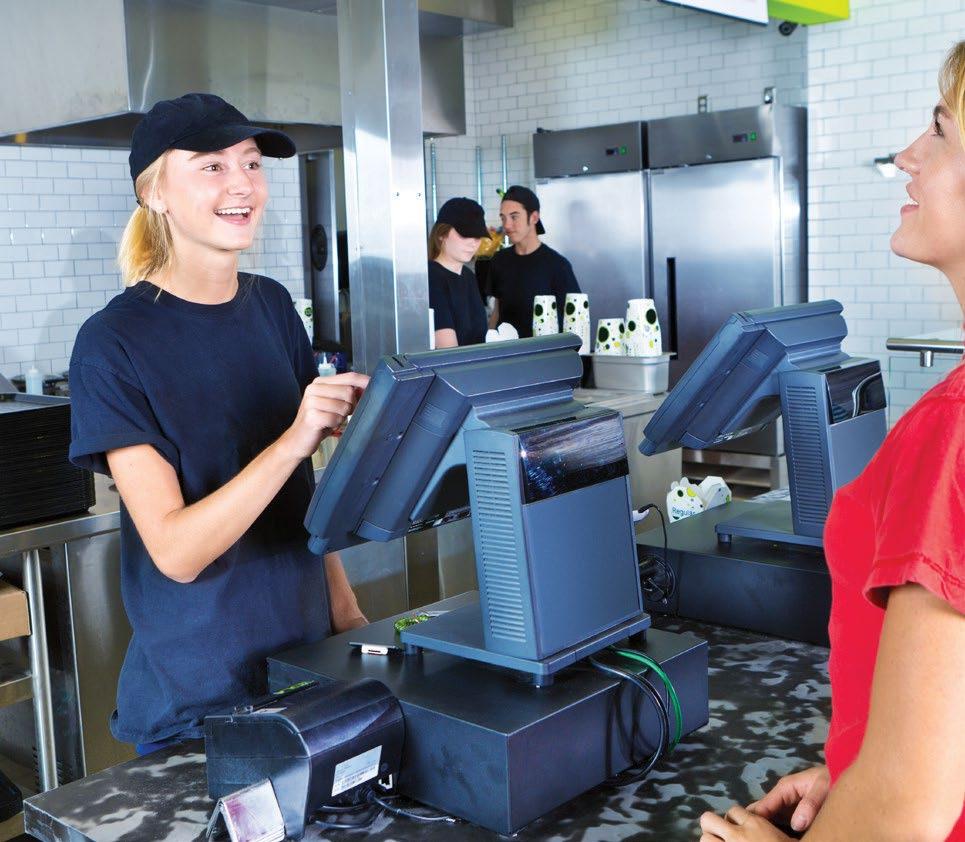


5
In “The Daily Entrepreneur: 33 Success Habits for Small Business Owners, Freelancers and Aspiring 9-to-5 Escape Artists,” we talk about the power of habit development and show how to use it to overcome your specific challenges. What makes this book different is it’s organized according to obstacles that we all face daily.


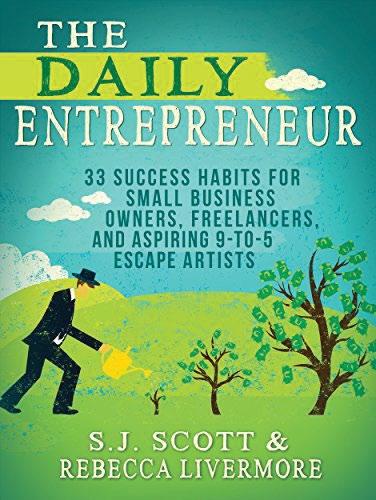
6
This podcast focuses on more than just inspiration. “The Goal Digger Podcast” also has episodes on business, branding and marketing. The host, Jenna Kutcher, has guests like Barbara Corcoran of the TV show “Shark Tank” and covers topics like being a working mom or dealing with difficult customers on the job.


7

Both successful entrepreneurs and chess grandmasters have the vision to look at the pieces in front of them and anticipate their next five moves. In this book, Patrick Bet-David translates this skill into a valuable methodology that applies to high performers at all levels of business. Whether you feel like you’ve hit a wall or lost your fire or are looking for innovative strategies to take your business to the next level, “Your Next Five Moves: Master the Art of Business Strategy” has the answers.

8

TeamGantt is a refreshing take on project planning software that brings gantt charts online. You can plan, schedule and manage your projects with the free gantt chart creator. Best of all, you can invite clients and teams to collaborate on a gantt chart or project plan. n

2021 ISSUE 3 | 19
NETWORK STANDARDIZATION: The Lynchpin in Restaurants’ Ongoing Digital Renaissance
We’re in the middle of a never-before-seen wave of digital acceleration across almost every type of business. This is especially true for the food and beverage industry. The pandemic ushered in an unprecedented acceleration in digital transformation for restaurants – dramatically changing operations and customer service, probably forever. The increased customer need for contactless transactions brought with it more online ordering, customer-facing apps and QR-code menus.
The brands that were successful in quickly rolling out new innovations and meeting changing customer demands had one thing in common: They already had standardized networks and strong digital foundations in place, allowing them to easily launch and scale new products and applications across many locations. Their existing digital foundation provided the agility to quickly provide customers and employees with unified and cohesive experiences through digital POS and ordering systems. To provide consistent service, restaurants needed reliable, resilient, high-speed networks that spanned entire brands – leveraging local and wide-area network connections to implement improvements at all locations simultaneously through centralized network control.
Heavily focused digital operations and customer service are very much expected to continue, according to Marybeth Pearce, Comcast Business executive director of food and beverage enterprise solutions. “Now that customers have had a taste of the digital future of dining, their expectations for digital dining experiences will continue to grow, regardless of the pandemic’s trajectory,” she said.
This dramatic rise of digital commerce and innovations in operations and customer
experience put new demands on network technology, with greater bandwidth and connectivity needs, increased reliance on cloud applications and point-of-sale systems, and the ability to scale tech solutions across locations efficiently.
What’s next?
It’s clear that customers prioritize contactless service: 48% report feeling safer when contactless service is available, according to IDC, preferring such options as contactless delivery, pickup or payment. To meet this demand and offer improved customer service, restaurants are continuing to adopt new technology options such as digital menu boards that are easily updatable to reflect menu changes and provide the latest information on hours of operation, daily specials and any changes in safety protocols. The continued growth of contactless engagement also includes digital interfaces to place orders via self-serve kiosks as well as drive-thru options like voice recognition and contactless pick-up improvements like digitally connected lockers.
Pearce says that these improvements are also providing new upsell opportunities for restaurants. “Through personalized menu boards, online ordering and mobile apps, restaurants can learn customer preferences and serve them targeted suggestions, resulting in better experiences for the customer and additional revenue for the operator,” she said.
That type of rich personalization and customer experience is, of course, underpinned by foundational technologies like business Internet and software-defined networking, internal and customer-facing Wi-Fi networks, cellular failover and security solutions to help keep transactions and data safe.
Operational improvements
Consumer confidence in eating out will require adherence to high safety and cleanliness standards. Internet of Things devices will be used to track supply chain items to reduce waste and ensure food temperatures are properly maintained and safety checks done on a regular basis. “Backof-house digital technology can be used to deliver food faster and more efficiently,” said Pearce. “Through automation, orders can be easily managed when coming in from multiple channels to multiple locations.”
What do restaurants need to handle what comes next?
Delivering on these varied technologies requires a strong, flexible IT infrastructure in each restaurant. Network hardware and software need to be kept up to date with regular refreshes to support new functionality. Managed services can help restaurant operations run more smoothly, allowing restaurant owners and managers to focus on their customers and deliver a superior dining experience. Restaurants also need to ensure their network connectivity is robust enough to handle the increase in online orders and delivery schedules as well as touchless experiences.
The digital transformation for restaurants was pushed into overdrive throughout the last year and a half, and that acceleration doesn’t show any signs of abating. To be successful, restaurants need to roll out innovation quickly – and that means having a brand-level foundation that allows for agility and scalability. n
Comcast Business is a Sapphire partner member of the National Franchisee Association. The company may be reached at 267-283-8261 or www.business.comcast.com.



20 | 2021 ISSUE 3 2021
No Nonsense Franchise Expansion
Almost every franchise owner considers expanding their network at some point, but it’s not always an easy dream to make happen. First, they need to wait until the right opportunity arises. Second, when it does, they must move quickly to secure the funding they need to get the deal done.
“This is where the roadblocks arise for most franchisees,” said Bracken Gardner, Northern Bank’s franchise relationship manager and vice president. “Most banks tend to move slowly and follow their own process and pace when it comes to franchise lending, and there’s still no guarantee you’ll get the loan after months of waiting. Many times, the franchisee just doesn’t have enough time to get the loan approved and close the deal. At Northern Bank, we handle our franchise loans a little differently.”
Northern Bank has been working with franchise owners for over 30 years, helping them operate, expand and build on their business. What makes Northern Bank unique is that it takes the time to look at each franchisee’s individual situation and how capable, prepared and passionate they are about their business expansion. “We don’t rubber stamp deals,” said Gardner. “We look at each loan on a case-by-case basis and work with the franchise owner to make the deal a reality for them as quickly as possible.”
Northern Bank’s knowledge of a franchisee’s challenges and no-nonsense approach to franchise lending is one reason franchise owners James and Sarah Cammilleri turned to Northern Bank when they were ready to expand their network.
The Cammilleris were owner/operators of 12 successful BURGER KING® franchises when they had the opportunity to purchase
47 more and significantly expand their operation. Since they had been very successful managing their current network and were rated the No. 1 BK® franchisee at the time, they decided to go for it. However, they needed to secure a loan quickly to make it happen.
us,” added Sarah Cammilleri. “Other banks we talked to spent all their time trying to sell themselves to us versus working with us. We always struggled to get a bank to come alongside us and collaborate with us. Northern Bank has been that perfect partnership.”
“Expanding our franchises has allowed us to not only build a successful business operation, but also to give back to others, and that’s really important to us,” James Cammilleri continued.
“Our philosophy is to put people first, both in our business and in our personal lives,” he said. “Northern Bank helps us achieve our business goals, and that enables us to give back in a way that is meaningful for us, which includes taking good care of our employees. When Northern Bank gives you a commitment, you know you can count on it. We don’t want to be with any other bank.”
Once the decision was made to expand, the Cammilleris wanted to get the acquisition done as soon as possible. They spoke to one bank first about a loan, and they were told they should wait another year before expanding. That’s when they got in touch with Northern Bank.
“The whole deal was a challenge,” James Cammilleri explained. “We were presented with an offer to buy 47 locations. Going from 12-59 locations is a big jump. Northern Bank came in eager to help and ready to work with us on it. They did their homework. They saw we had strong financials, and we were capable of doing this. They helped us overcome the hurdles and got the deal done.”
“Northern Bank was a godsend for
Gardner summarized it this way: “We’re the bank that grows with you as your ambitions, business and opportunities grow. That’s why franchise owners like the Cammilleris choose to work with us.”
For more information, visit nbtc.com/franchise or contact Bracken Gardner at 781-569-1575 or bgardner@nbtc.com.
Northern Bank provides financial solutions to help franchise owners manage and grow their networks as efficiently and cost effectively as possible. Member FDIC. n


Northern Bank is a Sapphire partner member of the National Franchisee Association. The company may be reached at 800-273-6908 or www.nbtc.com.

2021 ISSUE 3 | 21 2021
“Expanding our franchises has allowed us to not only build a successful business operation, but also to give back to others, and that’s really important to us.”
– James Cammilleri
Get to Know...
BURGER KING President of US and Canada
Tom Curtis
Tell us about your career before BURGER KING®.
I started in the restaurant business in high school, working in various restaurants around my hometown of Asheville, North Carolina. Some were fast food and some were fine dining. My first two years at Emory University, I focused on my studies and did not work in the restaurant business, but then as the funds dried up and I had to pay the bills, it was time to get back to work.
Somebody encouraged me to go to Domino’s because drivers made a lot of cash there. I spent the last two years of my college career delivering pizza. When I graduated from college, I went to work for The Prudential, where I “enjoyed” a nine-month remarkably brief career as a financial planner. I returned to my local Domino’s because I missed being in the restaurants, loved the fast pace and loved the camaraderie of the team. Domino’s had an entrepreneurship program, and if you worked successfully as a manager for a year, they would help you find funding for your own restaurant. After working up to the manager position and learning the business for a year, I bought my first restaurant in New Haven, Connecticut, in 1987.
I grew the business to seven restaurants in Connecticut over 19 years. In 2006, I decided to pursue a new course in life. I sold my restaurants and “retired” to determine my future course and direction. After about six months, I returned to Domino’s, this time joining the corporate side of the business. I was an operations and business consultant in several parts of the country, and then became a director of operations for Domino’s in the Northeast region.
After leading the region for two years I became the director of strategic market development. In this role, I launched a Fortress Market Project in Seattle, Washington, testing a new Pizza Theater store model and launching a holistic development, operations
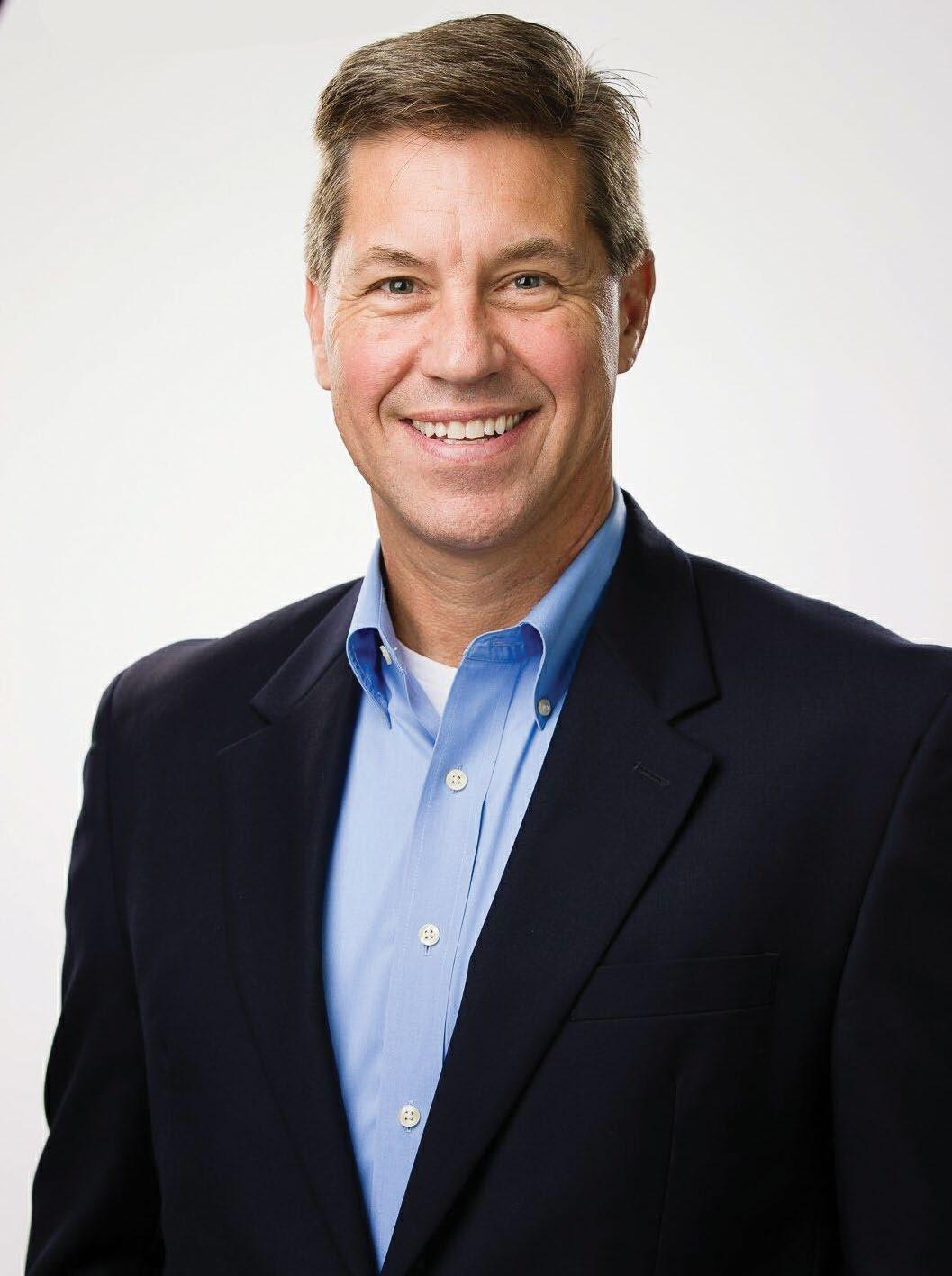
and marketing strategy. The objective of the project was to be an aspirational template for all markets in the country, demonstrating market dominance and leadership that the system would aspire to.
The franchisees in Seattle transformed their market and became the first and best example of what success at Domino’s would ultimately look like across the country. Upon completion of the project, I moved on to various roles, including vice president for the western U.S., vice president for global operations support and training, vice president of franchise relations and vice president of innovation.
After that I joined the leadership team for Domino’s 410 company stores. The team turned that business around (profitability, sales and operations) and made it a great place to work. My final role at Domino’s was leading the U.S. business (company and franchise) prior to joining BURGER KING.

How did this background prepare you for your role with BURGER KING?
Having been a franchisee, understanding the requirements and the passion that goes into being a franchisee and how that can translate into a great franchisee-franchisor relationship. Even in

22 | 2021 ISSUE 3
challenging conversations, I still believe we are a family, trying to accomplish the same great things together. It’s always made for a very comfortable and productive relationship, and I think we will have a natural partnership with our franchisees.
What drew you to the BK® brand?
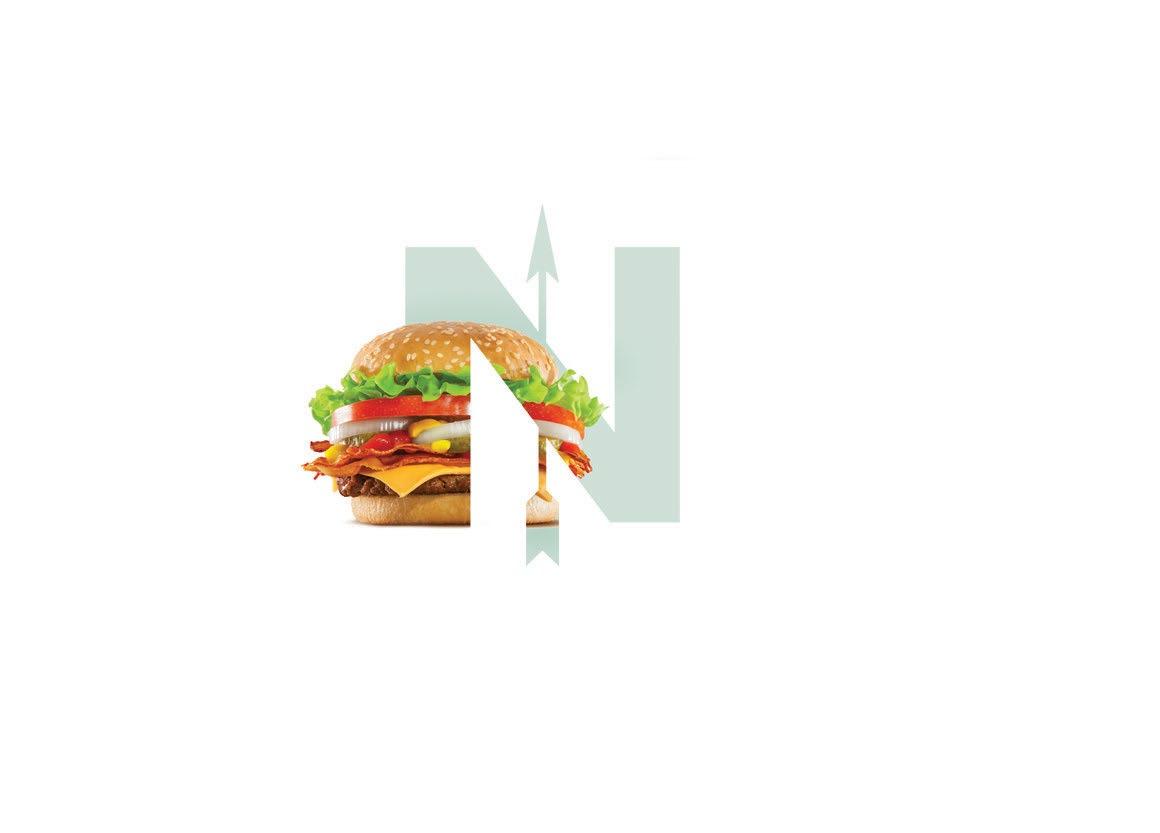


Two things. I lived and was part of an amazing journey at Domino’s – a journey of a distant No. 2 becoming a dominant No. 1 brand. The journey was the most exciting part of it. When you get to the destination, you are there for a minute, you savor the moment and then you say to yourself, “What’s next?” It is the natural next step to want to be a part of that journey again. My early communication with Restaurant Brands International (RBI) leadership was also a strong draw. The eagerness to learn, grow and go on that journey to No. 1 was evident.
As I thought about BURGER KING as a brand specifically, it was a brand that I was very close to as a kid. I was always a fan and admirer of BURGER KING because of my appreciation for our delicious WHOPPER® and the excitement of going to BURGER KING and getting a crown. To even think about living that same journey with the brand that I loved as a kid, there was no way I was going to say no to that.
What are your day-to-day responsibilities?
Making sure the team is set up to succeed and has clear direction. Immediately, it’s about building a focused plan that’s for the short term and the long term. That calls for frequent meetings with the leadership team and close work with the franchisees. Once the plan is built, it’s all about urgency in execution and daily work on all the initiatives that will strengthen and grow the brand.
What is the greatest challenge facing the BURGER KING brand?
In the short term, it’s the commodity/input costs, staffing and the pressure both are putting on the P&L. These challenges deserve our daily attention. Long term, I don’t want these challenges to distract us from the need to truly transform the guest experience and how we go from being a follower to a leader. When you’re scrambling hard and trying to make sure the bills get paid and the top line grows and the stores get staffed, it’s hard to think about and hard to work on the truly transformational experiences that will make us the leader in the quick-serve restaurant (QSR) space.
I think finding the space to take care of those short-term needs and pursue a more long-term ambition is the biggest challenge right now. We’ve got to walk and chew gum at the same time.
What is the new transformational strategy being undertaken by BURGER KING and what will it mean for the brand, particularly following the COVID-19 crisis?

There are six priorities in our strategy but they can be condensed into four. We shared the priorities and some of the initiatives with our franchisees in the road show. Broadly, the priorities are around:
1. Consistent operations and digital experiences as a foundation.
2. Sales growth through great brand positioning and marketing platforms that speak to our strengths.
3. Accelerated improvement of our physical assets (our restaurants).
4. Improved unit economics and a great franchisee-franchisor relationship that can fuel growth and reinvestment.


Continued on page 24

2021 ISSUE 3 | 23 MEMBER FDIC NBTC.COM Get growing with Northern Bank. To learn more about what Northern Bank can do for you, call 781-569-1575 or email BGardner@NBTC.com Build Remodel Expand FRANCHISE LENDING MADE EASY TO FRANCHISE OWNERS We expand your options. You expand your business.
Tom Curtis
Continued from page 23
None of this is solely the franchisees’ or the franchisor’s responsibility. These are our priorities collectively and as a team. We all have a part to play as we position the brand and the franchisees for success in a world that has changed dramatically due to COVID-19.
What do you hope will be accomplished as this strategy is implemented?
My hope and intent is that we will create a better world for those we touch – this is very aspirational and broad. But we have to provide:
• Great food and exceptional, convenient experiences for our guests.
• A place for our team members to learn and grow, but we have to have a brand for guests.
• Strong returns for our operators so that they can deliver the first two accomplishments I mentioned. If we accomplish all three over the course of time, then the brand will grow and the RBI stock price goes up as well. Tactically, once again, it’s simplifying operations, making BURGER KING an easier place to work and hitting the message in a relevant way for society and communities today.

What makes the BURGER KING franchisee community special?
Its longevity and perseverance – the family dynamic. I actually met a fourth-generation franchisee here at BK. That longevity creates a connection and love for the brand that makes [franchisees] very resilient even in times of stress. It makes them open and transparent, and that’s very helpful for the brand if the message is delivered respectfully and received without defensiveness. Through tough times and through good times, this group of franchisees is always going to be with BURGER KING.
What is your vision for the brand in five years?
Aspirationally, five years from now we are going to be a rapidly growing and thriving brand. We will be at significantly higher average restaurant sales, $1.85 million ARS in five years. We’ll have 8,000 units operating because franchisees will be eager to grow, and they’ll be eager to grow because the average store will be making $230,000 a unit. We’ll have an engaging digital platform with 40% of our sales coming through digital. That will create a robust data set that we can analyze so that we can further serve our guests in more relevant ways.
What are the most important and lasting changes that the food-service industry will see post-COVID-19?

The pandemic has certainly changed the way that people think about eating food. There’s going to be more food eaten off-premise than pre-COVID 19. Being able to serve efficiently and effectively off-premise is going to be the most important component of whether we are successful.
What are your favorite things about the BK brand?
The coronation of a child with a crown – that’s a way to make a kid feel special. The crown is very representative of achievement and accomplishment. Kids feel special when they come to BURGER KING, which might be something we could capitalize upon as we go forward. For the people who bring the kids in, a flame-grilled burger is also a reward and tastes better than a burger you can get anywhere else. So you can treat yourself and treat your family all at the same time. I don’t think anyone else can offer that.
What would people be surprised to know about you?
Despite really enjoying being around and learning from people, I really love hiking and biking on my own. That’s my own personal time where I get to reflect on important things in my life, like my family and my work and my faith. When I exercise, I like doing it alone. Exception … I do love mountain biking and introducing others to the sport.
Tell us a little about your personal/family life.
I was born and raised in Asheville, North Carolina, and lived there until I left to attend Emory University in Atlanta. I’ve been married 34 years to my wife, Mary Ann. I met her in Atlanta, and she joined me in Connecticut when I franchised with Domino’s. We’ve got four kids. My oldest daughter still lives in Connecticut and has her entire life there. My son lives in Atlanta. He is the chief operating officer for the second-largest Domino’s franchise in the country. I have a daughter who’s in PA school in South Carolina and a son who graduated from college in May. He is in a technology leadership development program at Domino’s. My two sons were shocked when I announced that I was leaving Domino’s, but I have a hope that they will ultimately be here with me. My parents and siblings live primarily in the southeastern U.S. We had very humble beginnings. My dad was a teacher. My mom worked in an office. They both worked hard and loved what they did, but put family first. It’s been a fairy tale life. n
24 | 2021 ISSUE 3
Being able to serve efficiently and effectively off-premise is going to be the most important component of whether we are successful.
My dad was a teacher. My mom worked in an office. They both worked hard and loved what they did, but put family first. It’s been a fairy tale life.
2022 NFA DAY ON THE HILL


SAVETHEDATE

2021 ISSUE 3 | 25
29-31, 2022
MARCH
HYATT CAPITOL HILL | WASHINGTON, DC
Transforming the Dining Experience
Happy customers are the ultimate indicator of a successful restaurant. While nothing can replace the excitement of diving into a delicious WHOPPER®, customers are looking for entertainment besides scrolling through their phones while they’re waiting for their order or enjoying their meal. Surveys show that two trends stand out for how guests will decide where to give their business: convenience and digital experiences. Here’s what that means for next-generation dining experiences.
Successful restaurants have gone digital
Today, the standard for serving guests increasingly includes digital experiences. Whether for safety measures or simply an easier transaction, customers now expect that businesses can offer the convenience they’re used to online – at all times.
This past year has brought significant strides in digitizing the food industry’s customer journey, from ordering to payment and delivery options. Now, half of consumers say they plan to dine out more frequently in the next six months, driving up competition. The venues that stand out will be those that create a memorable environment supported by digital interactions.
For guests, it’s all about convenience
Sixty-two percent of consumers say that the top reason they decide on a restaurant is convenience. Though the ability to order and pay anywhere has enabled off-premise options like faster delivery and takeout, it’s also transformed what guests expect from a restaurant’s physical space.
Surveys show that guests are looking for their in-person dining experiences to include easy ordering, direct communication on a venue’s health and safety practices, and personalized offers.
Venues have an opportunity to build deeper relationships with their customers by applying the convenience and personalization of an online experience to their physical spaces.
The secret sauce for BK digital experiences? Your TV
Introducing Atmosphere TV, the world’s leading streaming TV service for businesses. We offer original, audio-optional TV channels, specifically designed to build a deeper connection with customers by playing curated content that can be customized to your franchise’s needs.

For BURGER KING® owners everywhere, Atmosphere provides the optimal opportunity to capture your customers’ attention, and ultimately, create a memorable experience that will keep customers coming back again and again.

The secret sauce comes down to our content. We have designed an entirely new class of TV programming that redefines
the standard for out-of-home video and is intentionally built to keep your customers engaged until they hear that mouthwatering call for their order. Choose from over 50 of our family-friendly channels, updated regularly with fresh content.
Or better yet, check out the custom BURGER KING TV channel, available exclusively to franchisees. This channel gives customers access to BURGER KING-branded content that they can’t get anywhere else – a custom blend of our most engaging family-friendly channels seamlessly integrated with the BURGER KING brand. It’s the perfect way to build franchise recognition while playing programming that leaves customers feeling happier.
Atmosphere adds a little levity to your space by entertaining, delighting and engaging your customers. Businesses can also maximize their TVs by running their own marketing promotions, limited-time offers and house ads within Atmosphere programming using our digital signage feature.
Digital Signage Manager allows you to speak directly to your customers. Create compelling visuals for your business by selecting from over 100 customizable templates or simply uploading your own assets. The platform, available through the Atmosphere Pro subscription (which BK® owners get for free), is easy to use and easy to update as offers change.
The bottom line
Unlike cable, which offers zero return on investment, Atmosphere delivers a real impact on sales. Consider these growth data points that occur across Atmosphere’s thousands of restaurants and venues:
• 14% increase in new business
• 19% increase in repeat guests
That’s the difference. And it’s free for all BK locations. Atmosphere delivers flexibility and personalization that adds significant value without any cost.
As so many businesses are reevaluating how they deliver a memorable experience to their customers, it’s critical that digital content be incorporated to transform the dining experience.
Want to learn more? Visit www.atmosphere.tv. n
Atmosphere TV is a Sapphire partner member of the National Franchisee Association. The company may be reached at 512-947-5789 or www.atmosphere.tv.


26 | 2021 ISSUE 3 2021
Advocate for Your Business at NFA’s Day on the Hill
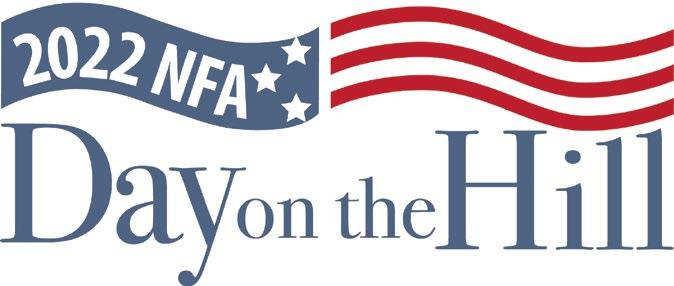



In November of 2020, the national election flipped control of the White House and Congress and touched off a wave of change still rippling across the nation, affecting businesses on a range of issues, from labor to taxation to regulation.
At the National Franchisee Association (NFA)’s Day on the Hill event, scheduled for March 29-31, 2022, in Washington, D.C., BURGER KING® franchisees will have an opportunity to learn more about these important issues from political and legislative experts and then discuss them face to face with their members of Congress.
The event demonstrates the effectiveness of person-to-person communication to affect legislation. “During visits on Capitol Hill through the NFA, I have seen firsthand the power of a simple conversation and relationship to move our causes front and center with our elected officials,” said Ohio-based BURGER KING


franchisee Josh Lephart of LEPSCO Inc. “I encourage all franchisees to reach out to your representatives and educate them on your business.”
Last year’s election showed that just a small number of votes in one or two races can make a big difference, and as the nation sits a year away from the mid-term elections, control of Congress is again up for grabs. Participation in the process demonstrates to elected officials that their constituents are engaged and paying close attention to their actions heading into the election.
By adding your voice to the NFA’s support for leaders who pursue pro-business and pro-industry policies, you will help to improve conditions for the entire BK franchise system. Mark your calendar to attend the NFA Day on the Hill now. Event registration will open in November. n

2021 ISSUE 3 | 27 Atmosphere is the leading FREE streaming service for businesses. NOW INTRODUCING BK TV Engaging, custom content that is FREE to Burger King franchises. To get started, or if you have questions, contact Joey.Martinez@atmosphere.tv 512-947-5789 Better TV for Business ELEVATE THE BURGER KING BRAND KEEP CUSTOMERS ENGAGED WITHOUT THE COST OF CABLE SCAN QR CODE TO SIGN UP
A CLEAR MISSION & VISION PROVIDE STRONG FOUNDATION DURING TURBULENT TIMES


Events of the past two years have shaken business organizations to their foundations. From disrupting operational models and sales channels to altering the labor market and slowing the supply chain, the restaurant industry has been particularly affected by the events caused by the coronavirus pandemic.

It’s in times of change that having a set of core principles and overarching sense of purpose can be more valuable than any other. Yes, flexibility and agility are important, and the hospitality industry, particularly, learned that over the last 18 months. Restaurants and brands that quickly leaned into digital
sales channels to augment takeout and delivery certainly carried the day better than those that didn’t have that infrastructure in place.
But the ability to pivot quickly when the worst of the pandemic restrictions took effect in 2020 may have also been a good measure of whether an organization is built upon a firm foundation with solidly defined and well-rooted mission and vision statements.
by SEAN IRELAND
Mission statements define a company’s business, its objectives and its approach to reaching those objectives. Vision statements
28 | 2021 ISSUE 3
ISSUE
describe the desired future position of a company. Elements of both statements are often combined to identify the company’s purposes, goals and values. Mission and vision statements guide the people who lead and staff an organization on what and where it is and where it should be going. Companies that establish and focus on the organizational definition and purpose they have established in their statements are often the ones that manage business disruption the best.

That’s not to say that the challenges those organizations face are any smaller because they have developed guiding statements. Labor shortages and supply chain issues are just as challenging for them as any other organization. However, companies founded with a clear idea of what they are and what they want to become have an established culture that gives them a leg up when navigating the turbulence and keeping their teams moving forward together.
A great example of one such organization is Ambrosia QSR, led by President and CEO Luke Pisors. The company has 152 restaurants, including over 135 BURGER KING® locations. Pisors has worked 30 years in the restaurant industry, most recently as senior vice president of operations for Arby’s before leading Ambrosia QSR. He said he believes strongly in the power of an organization’s culture to spark growth, and culture is built upon the messages found in mission and vision statements.
“We talk about the importance of consciously creating a culture, from the interview to orientation to training throughout the entire job experience,” Pisors said. “While what we aspire to be is important, we’ll never realize those aspirations without being intentional about who we are.”
TraitSet
Ambrosia QSR very clearly defines what it does and how it will grow with these statements:
What: We are a quick-service, multibrand restaurant operating company focused on growth.
Who: We are engaged, energetic, empathetic restaurant professionals.
How: We will achieve our goals by focusing on the growth of our people, the experience of our guests and the profitability of our company.
The company concentrates on its teams as the key to carrying out what’s contained in its core philosophy. “While there are dozens of factors that we all look for when selecting people for our team at all levels, we stay very focused on our cultural foundations of energy, engagement, empathy and execution,” Pisors said. “Each of these values have supporting elements that are built into our communications, our onboarding, and our recognition and training programs. We hold each other accountable
Continued on page 30
• Sign three-year KAY® Machine Warewash Program agreement and install by 12/31/21 to qualify*


• Ecolab will credit first THREE monthly program payments


• Ecolab will also provide startup product at NO CHARGE
• Incentive value up to $900 per location depending on machine type
2021 ISSUE 3 | 29
Recruiting Tools THREE FOR FREE NEW WAREWASH CUSTOMER INCENTIVE
©2021 Ecolab Inc. All Rights Reserved.
of owner/change of machine agreements do not qualify CONTACT YOUR KAY QSR REPRESENTATIVE FOR MORE DETAILS
800.529.5458 *Change
Mission

Continued from page 29
for each of them as a two-way street. For instance, I want my direct reports to be very engaged in every aspect of their scope of responsibility; however, it’s also my role to create an environment that engages them.”

Good mission statements use clear and simple language to succinctly define what an organization does. They avoid vague pronouncements and can be easily understood and recited. Similarly, good vision statements are specific and short, but they focus on the company’s long-term goals and what it wants to accomplish to guide the decision making of leadership.
“Finding the right tone for your mission and vision statements is tricky but important,” said Lynda Silsbee, the founder of the Alliance for Leadership Acceleration, in a story for Forbes.com. “Think of it like a song: You want it to be not only catchy and uplifting, but also representative of your organization’s style and culture. And, all the while, you must maintain concision and clarity.”
Silsbee also suggested making the statements distinctive so that they set a company apart from others in the same industry, and she noted that they should be durable and written to last for several years, not just one or two. However, she noted that after the difficult circumstances caused by the pandemic, now could be the right time to update organizational mission and vision statements or even create them if it hasn’t been done before.
Experts suggest that it is important to build statements on the core values that are important to the business owner, not around values that simply sound good. Building the mission and



vision of the organization on buzzwords and forcing them to fit into what the organization already does or trying to grow a culture around these inauthentic values won’t work.
Of course, good mission and vision statements and the values supporting them only go as far as they are implemented and ingrained into company culture. If the restaurant teams don’t learn and understand the messages in these statements or take them to heart, they are meaningless. Teaching the message takes concerted effort and emphasis over time, and it must grow from the top of the organization down to every level.
When that happens, mission and vision statements and the values and direction embedded in them are important factors that can determine how an organization fares in difficult times. In the case of Ambrosia QSR, the pandemic crisis has emphasized the need to rely on its core values more than ever. “While I’m thankful that we identified empathy as crucial to who we want to be a couple of years ago, I think we had the opportunity to exercise that value more often than usual over the past year,” Pisors said.
“I think that empathy has been the cultural foundation that a restaurant operating company has needed at the core of its DNA through the pandemic and into this year’s staffing and supply chain challenges,” he added. “Being empathetic to our team members’ varying levels of anxiety regarding the pandemic and to each person’s unique reaction to the challenges has been vital to our ability to operate.” n SEAN
30 | 2021 ISSUE 3 You can be everywhere at once bkrequest@dtiq.com 800.933.8388 www.dtiq.com/burgerking/ · · Next-Gen Video Reporting that transforms how you manage your locations
IRELAND is the NFA director of communications.
may reach Ireland at 678-797-5165 or seani@nfabk.org.
You
Addressing the New Era of Staffing Shortages Through Employee Job Satisfaction
If 2021 had a sign of the times, it would be “Help Wanted.” Published statistics bear out what so many of us experience every day. (Apologies in advance if this is like salt in an open wound.)
• Restaurants are closing due to staffing shortages. According to a survey conducted by QSRWeb in May, more than 32% of restaurant leaders have closed or are considering closing restaurants as a direct result of staffing shortages.
• According to industry hiring app Landed, the staffing deficit for food service is 3.4 million positions and shows signs of growing.
• Employment at eating and drinking establishments is 12% short of pre-pandemic levels, according to the National Restaurant Association.
Combating Turnover with Employee Satisfaction Initiatives
Hoping to retain employees for longer, many quick-service restaurants (QSRs) are redoubling efforts to make QSR jobs easier so existing workers have the bandwidth to provide excellent customer service at those points where people are needed.
Automation (when it’s done right) can improve the overall employee experience, which can lead to better retention. In fact, one Xenial customer reduced staff turnover to zero and reduced peak period staffing by one person when they implemented Xenial self-order technology.
Implementing user-friendly technologies can positively affect your entire operation, and every worker and manager, front to back.
Xenial RTI Back Office Helps Operators Optimize Labor Costs, Scheduling and Employee Satisfaction
Perhaps no other technology has a greater impact on store performance than back office. Here are a few ways that Xenial RTI Back Office can help:
• Automated scheduling optimizes staffing, saves time and slashes labor costs.
• Managers can approve and send employee schedules with one click.
• Forecast staffing demands down to the hour (most back-office solutions only forecast down to the shift or daypart).
• So simple, people want to use it! Role-based task lists help people focus on what’s important. And to help you address inevitable turnover, these easy-to-follow task lists, as well as contextual user help and tutorials, guide new users, step by step, so they become proficient with little to no training.
Proof in the Numbers
As a direct result of BK® franchisee The Phoenix Organization’s use of Xenial Back Office, Russ Lo Bello and his team consistently maintain the top operating metrics of any BURGER KING® franchise owner nationwide.
Closing Thoughts
Xenial offers technologies for the entire restaurant operation, front to back of house. Our next-gen drive-thru innovations help restaurants solve the labor shortage and can contribute to employee retention. Xenial RTI Back Office is now cloud-based; it’s easier than ever to use in-store and still powerful above-store. n
Xenial is a Sapphire partner member of the National Franchisee Association. The company may be reached at 215-485-0292 or www.xenial.com.
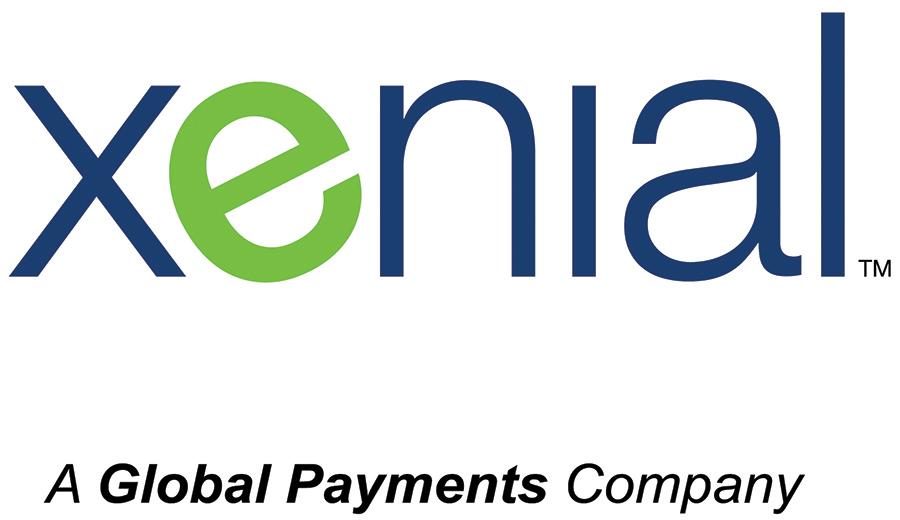


2021 ISSUE 3 | 31
2021
“There isn’t anyone in the country that has better labor costs than I do. My gross profit is the best in the country for PLV because of Xenial Back Office.”
– Russ Lo Bello, BURGER KING franchise operator, managing partner, The Phoenix Organization
COMPOUNDS Labor Shortage Supply Chain Issues


From the perspective of hospitality business owners, economic recovery from the coronavirus pandemic has been plagued by two vexing complications, with one feeding into the other.
The ongoing labor shortage that affects the abilities of franchisees to keep their restaurants fully staffed is having a secondary but equally harmful effect on the supply chains that provide the products, packaging and equipment those businesses need to keep running efficiently. Shortages of drivers and warehouse workers have slowed the flow of goods and equipment to businesses, forcing them to adjust even further from their ideal levels of operation.
Experts warn that for both the labor and supply chain markets, a return to normal is likely still far down the road. Unfortunately,
combatting the cascading consequences of the disruption in these markets will remain the focus of business owners for months to come.
“The current cross-industry labor shortage will remain our biggest challenge. This, combined with transportation pressures and tight supply of raw material, is continuing to create a ripple effect across the supply chain, producing an unprecedented climate of daily challenges,” said Joel Neikirk, president and CEO of BURGER KING® supply chain partner RSI. “In other words, not only is there a limited amount of supply due to consumer demand, but also a myriad of transportation challenges in getting what we do have where it needs to go, all of which, in conjunction with
32 | 2021 ISSUE 3
ISSUE
labor challenges and despite our relentless efforts, are impacting costs.”
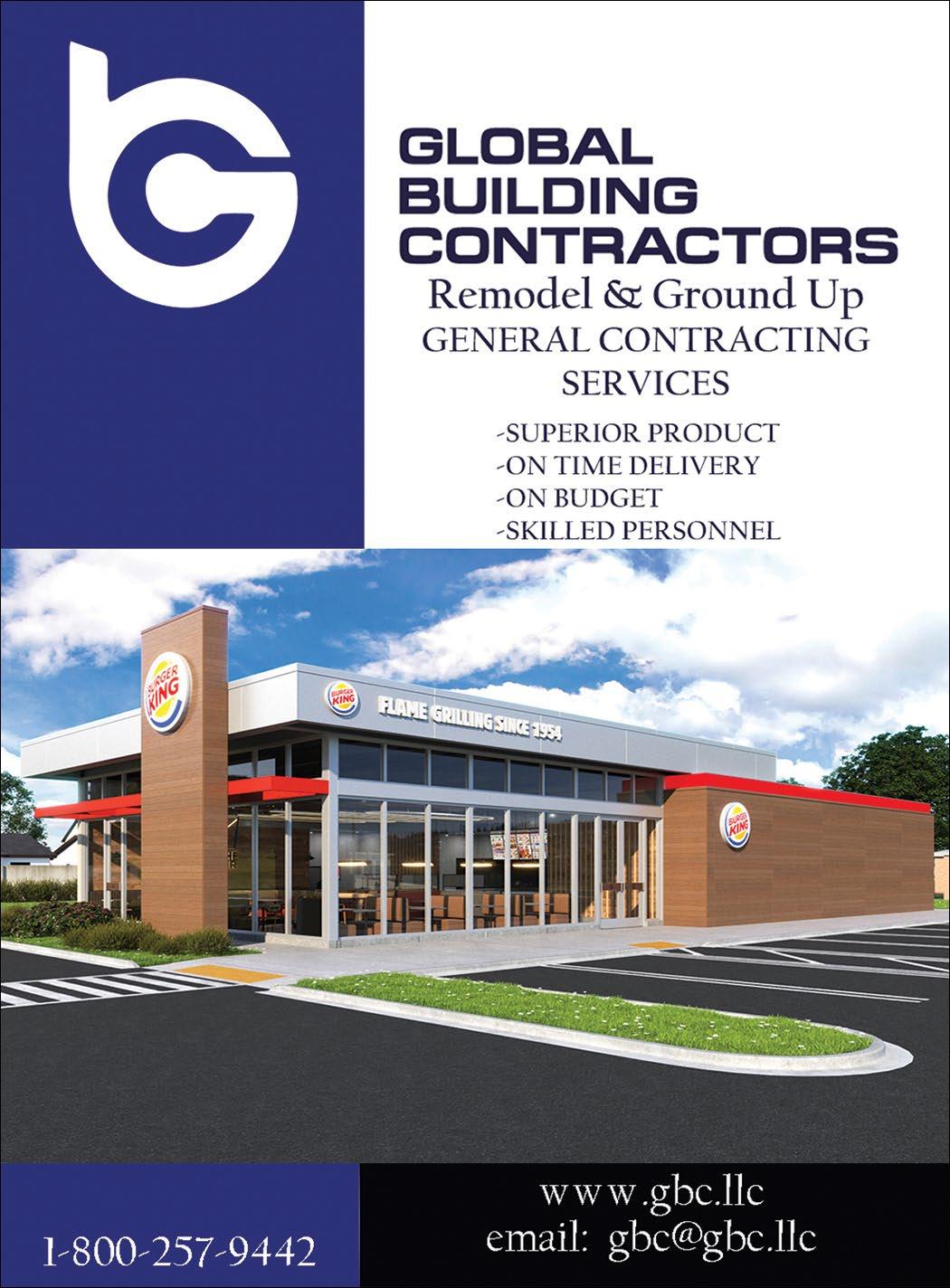

Businesses across the spectrum are suffering. A dearth of computer chips left auto dealers low on inventory for the summer and fall. Paper and plastic packaging shortages led to random product shortfalls at many grocery stores. However, the hospitality industry has been uniquely affected, and the labor shortage is a chief culprit.

While it was a difficult task prior to America’s COVID-19 crisis, finding and keeping workers on restaurant-level teams has become even more trying in the wake of the pandemic. Through much of this year, as dining rooms reopened and operations began returning to normal hours and services, business owners struggled to hire as they competed against the enhanced federal unemployment benefits offered to the unemployed. The pool of potential workers was thinned even further by the struggles many had with child care because schools and day care centers weren’t open normally and by the fears of contracting COVID-19.
The nation’s labor shortage doesn’t end in the restaurant. The trucking industry has struggled in recent years to replace its aging workforce. Combined with other factors, including the increased demand for shipping from consumers buying goods online, the closure of driving schools due to the pandemic and others, shipping companies are also short on the personnel they need to fulfill orders, leading to delays up and down the supply chain getting goods to their final destinations. For restaurants, that means that needed equipment is often delayed.
Ohio-based BURGER KING franchisee Josh Lephart of LEPSCO Inc. has experienced the problem firsthand. “At my busiest location, a rooftop HVAC unit went out in June,” he said.

“The lead time on this unit is over nine weeks. We were able to find a unit two states over, but due to the trucker shortage, the delivery company demanded $3,000 to transport it. At another location, a freezer unit was deemed to need replacement. It will be eight weeks-plus before this will be in the kitchen.”
by SEAN IRELAND
Luke Pisors, president and CEO of Ambrosia QSR, a 152-location company, including over 135 BK® restaurants in Oregon and Washington, has noted the problem with large equipment too. “Our main challenge has been with lead times that have gone from a couple of weeks to several months on everything from fryers to HVAC components,” he said. “Deliveries have been interrupted due to staffing issues related to both warehouse and drivers, but we’ve largely been able to stay operational through any schedule changes or delays.”
Labor and other problems are also leading to shortages of some consumer-based supplies needed by restaurants, particularly paper products. “The biggest impact, from a supply chain perspective, has been felt in the packaging category more so than on food supply,” Neikirk said. “The growth of the delivery segment, coupled with COVID-19-related consumer behavior – the expectation to receive food packaged at all touchpoints, not only through drive-thru but also dine-in – has compounded the issue by increasing the demand for products such as bags and wraps, and even cups, cartons and cup carriers at a time when the nation’s paper supply is already running thin due to exceptionally increasing competition from e-commerce.”
Add this up with all the other disruptions related to the
Continued on page 34
2021 ISSUE 3 | 33
MONITOR & COACH: Safety Violations Cleaning Policies
Cell Use Vaping Behavior Issues
Supply Chain
Continued from page 33
coronavirus pandemic, and the sum equals one tough stretch for restaurant business owners. For those like Lephart, it’s increasingly difficult to keep the difficulties from affecting the bottom line. “While the equipment and supply lead times are concerning, the one that truly terrifies me is the labor supply chain,” he said. “This is in many cases driving the longer lead times and difficulties with deliveries. The labor shortage in our restaurants is forcing difficult decisions that are directly impacting sales.”
On this front, there is no relief in sight. The third quarter U.S. Job Market Report – a survey of 13,659 wage earners from across the country by online job marketplace Joblist – indicates that up to 58% of restaurant and hotel employees may quit their jobs over the rest of this year. The survey, highlighted in a story in Restaurant Business Online by Peter Romeo in early October, found that growing numbers of hospitality workers are suffering from dwindling job satisfaction. A third of the industry’s labor force now reports being dissatisfied with their jobs, a figure that is double what it was at the start of the pandemic. Only 42% of this workforce reports being satisfied with their jobs, down from 64%.
The numbers reflect some of what Lephart and others are seeing in their restaurants with the team members they do have –increased stress due to operating shorthanded and working under less-than-ideal conditions directly related to the supply chain problems. “My team is stretched thin with the labor shortage and to have them working in a hot kitchen waiting for weeks for a resolution is difficult,” he said.
“I think that in this staffing environment, there’s just a high level of tension and stress among our team, and any supply disruptions can affect the atmosphere in a restaurant,” Pisors added. “We’ve talked a lot about ‘planned presence’ from our multiunit leaders as we work to plan out a lot of presence in restaurants with key managers and team members, encouraging and supporting them through the challenges.”
If the labor market for restaurants gets worse before it gets better, as the survey indicates it might, and the overall labor market remains difficult for all businesses, the next few months will provide no relief in the business climate for anyone.

In the short term, that means it will be a matter of making the most efficient use of the resources restaurants do have and planning wisely to ensure that labor and supply chain challenges lead to as little disruption as possible. “I think we’re very fortunate to have a supply chain organization of the caliber of RSI,” Pisors noted. “We haven’t struggled as much as some other quick-service restaurant competitors.”
“Responding to and navigating these disruptions has really defined the core of our activity this past year and a half,” said RSI’s Neikirk. “The key to successfully doing so has been our business relationships – specifically, with our suppliers and distributors. Working closely with them, we have maintained customer priority status when they have been forced to prioritize and allocate product.
“They are also increasing their amount of days-on-hand inventory to ensure uninterrupted supply in the event of unforeseen disruption,” he said. “Further, with BKC’s support, we have identified new and alternate suppliers and onboarded additional
Today CONTROL LABOR COSTS, OPTIMIZE STAFFING, AND IMPROVE
Contact us to learn more at BKsales@xenial.com Predict staffing needs to the hour Optimize shift staffing Approve schedules with one click More than 10,000 multi-unit QSRs rely on Xenial RTI Back Office to control labor costs and supersize profits. Xenial RTI Back Office
Solve Today’s Labor Challenges,
PROFITS
production facilities for added capacity. Finally, through tremendous cross-functional effort, RSI’s departments have significantly increased the monitoring of inventories of core items in addition to promotional items.”
There will be additional efforts under way to take on other issues with the supply chain. “Although the pandemic has brought an entirely new set of supply chain challenges, it has also exacerbated an issue that predates COVID-19 – supplier and distributor consolidation,” Neikirk said. “Fewer options in our industry are impacting our negotiation strategies as well as supply availability when unexpected closures or supply interruptions occur. It is imperative that we foster our business relationships to find solutions that help alleviate the freight and labor cost pressures. Another top priority is to further strengthen our alignment with Burger King Corp. during calendar planning efforts, providing them with deeper insight into supply chain challenges and making collaborative, informed decisions related to promotional activity.”


At the restaurant level, planning will be key, especially when it comes to large projects. “Looking ahead, various components of furniture, fixtures and equipment related to remodels and new store openings are very delayed,” Pisors said. “In a project where so many aspects must come together somewhat simultaneously for an opening, that’s going to be important to plan lead times and have flexibility.” Lephart added that his company is stocking key components and replacements for high fail equipment so that if something goes out, there’s no delay replacing it.
Ultimately, the way out of the supply chain predicament entirely will be the easing of the labor market crunch. That will take time and may require several different remedies working in combination.

“Much of the cause is policy enacted from our government,” Lephart said. “To this end, it will take the policy makers to rectify it. I met with my congressman and voiced my concerns and thoughts. I asked him directly to help at any opportunity that came about policy wise. During visits on Capitol Hill through the NFA, I have seen firsthand the power of a simple conversation and relationship to move our causes front and center with our elected officials. I encourage all franchisees to reach out to your representatives and educate them on your business.”
There are other factors that can play a role too. The Joblist survey found that among former hospitality workers who have left the industry, sources of job dissatisfaction included low pay, lack of benefits, difficult customers, long hours and rigid schedules, and potential exposure to coronavirus. Employers who find creative ways to address some of these concerns quickly may have a leg up on improving their situations. With hope that the coronavirus pandemic is finally on its way out, health concerns will fade, and the Joblist survey suggests that the continued reopening of schools and child care centers will help too. About 40% of the respondents said their children’s need to participate in remote learning environments affected their work lives.
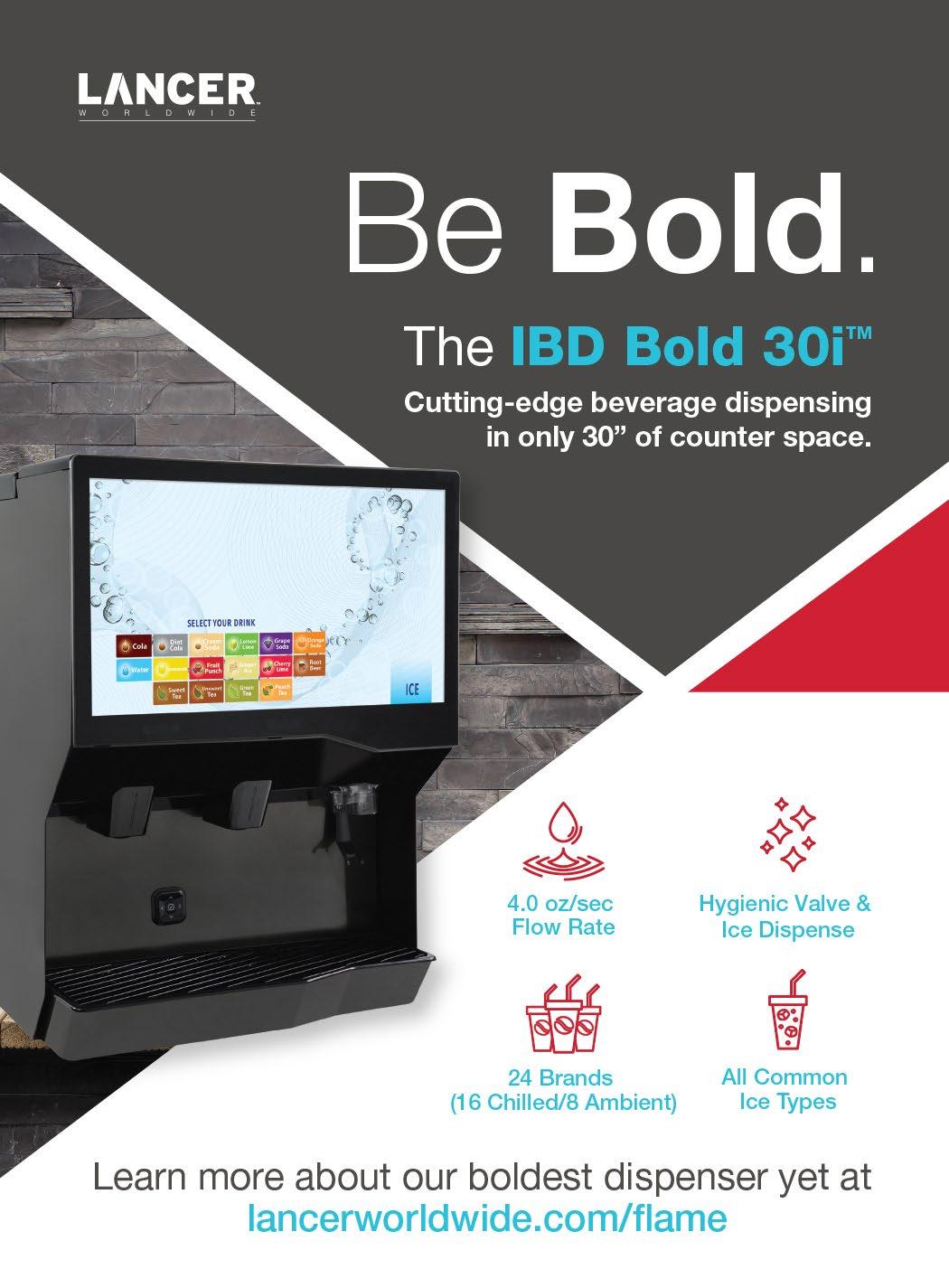
In the meantime, said Lephart, “We have great leadership in RSI that is working hard to eliminate and lessen the impact of the supply chain disruptions. Joel and his team are outstanding and working hard to help us all.” n

2021 ISSUE 3 | 35 Securities offered through Raymond James Financial Services, Inc., member FINRA/SIPC. Investment advisory services offered through Raymond James Financial Services Advisors, Inc. Hall Financial Advisors is not a registered broker/dealer and is independent of Raymond James Financial Services. #3659265 / Exp 07.22 www.HallFA.com ◆ 866.865.4442 1101 Rosemar Road, Parkersburg, WV 26105 ◆ 416 Hart Street, Marietta, OH 45750 We can help build your legacy. Business Retirement Plans Personal Retirement Planning Portfolio Management Estate Planning Strategies Equity Investments Fixed Income You’ve worked hard to build your business.
SEAN IRELAND is the NFA director of communications. You may reach Ireland at 678-797-5165 or seani@nfabk.org.
NFA Members Host Congressmen During ‘Bring D.C. to Your BK’ Campaign

In early September, the NFA’s Government Relations Committee (GRC) began a campaign to encourage franchisees to meet with their congressional representatives during the October legislative recess.
NFA Vice President of Legislative Affairs Misty Chally helped coordinate several meetings across the U.S. to provide NFA members with opportunities to meet with their local congressmen in their BURGER KING® restaurants and share their concerns about pressing legislative issues.

hosted Rep. John Rutherford (R-FL-04) in a restaurant in Florida. Congressman Bill Johnson (R-OH-06) visited franchisee Matt Herridge and his team at a restaurant in Belpre, Ohio, and franchisee Bruce Pavlikowski hosted District Director Keith Brekhus from the office of Rep. Tom O’Halleran (D-AZ-01) in one of his locations.
by SAVANNAH DALY
Because Congress had to return to Washington, D.C., for an unexpected budget vote during the week of Oct. 10, several of the planned meetings were postponed to later this fall. The NFA encourages its members to maintain relationships with their local representatives to ensure their voices are heard on Capitol Hill.
During the meetings, the legislators visited with restaurant team members and discussed labor, tax and transportation issues with franchisees. The NFA’s current legislative priorities are:
Labor: The NFA supports legislation that encourages individuals to return to work so that small businesses can operate at full capacity, as well as bills that provide needed recovery dollars for the restaurant industry. The NFA opposes the Protecting the Right to Organize Act, which implements several highly contentious policies that would shift employers’ focus from creating job opportunities to defending employment policies, and the Raise the Wage Act, instead asking for a more moderate incremental proposal to raise the federal minimum wage that accounts for cost-of-living disparities across the country.
Franchisee Patrick Sidhu of Premier Kings and his team hosted U.S. Rep. Buddy Carter (R-GA-01) in one of the company’s Savannah, Georgia, BURGER KING restaurants. Sidhu also
Taxes: The NFA supports the Main Street Tax Certainty Act to make permanent the Section 199A 20% deduction for qualified business income and the Death Tax Repeal Act to eliminate


36 | 2021 ISSUE 3
The NFA supports legislation that encourages individuals to return to work so that small businesses can operate at full capacity, as well as bills that provide needed recovery dollars for the restaurant industry.
The NFA supports the Drive Safe


burdensome compliance and monetary costs on family-run businesses.




Transportation: The NFA supports the Drive Safe Act, which creates an apprenticeship program for truck drivers over the age 18 to allow them to drive across state lines to alleviate the nation’s truck driver shortage. Current law requires drivers to be 21 to drive in interstate commerce. The NFA also supports the current commercialization ban prohibiting state departments of transportation from competing against the private sector by selling food and fuel at interstate rest areas.
While the Bring D.C. to Your BK promotion was focused on the October recess, feel free to reach out to NFA’s Government Relations Department any time to schedule an in-district meeting. n
SAVANNAH DALY is NFA communications coordinator. You may reach Daly at 678-439-2288 or savannahd@nfabk.org.
2021 ISSUE 3 | 37
www.integratedcashlogistics.com 412.906.0720 Next Day Cash. Expert Accountability. You’re Almost Out of Time! The new ASC 842 lease accounting standard goes into effect at the end of 2021. 407-559-2581 taj@leasecake.com Contact Taj Adhav for Your Free Consultation
Rep. Buddy Carter (R-GA-01) and Premier Kings franchisee Patrick Sidhu met at a BURGER KING in Savannah, Georgia, during the Bring D.C. to Your BK campaign week in October.
Franchisee Bruce Pavlikowski met with District Director Keith Brekhus from the office of Rep. Tom O’Halleran (D-AZ-01) as part of the campaign.
which creates an apprenticeship program for truck drivers over the age 18 to allow them to drive across state lines to alleviate the nation’s truck driver shortage.
Act,
Elevanta Adds Retirement Program to Member Services Options

The National Franchisee Association (NFA) and Elevanta have established a new partnership that will provide members with access to another service to better manage their businesses and offer more to their employees.

Through a partnership with Hall Financial Advisors, NFA and Elevanta are now offering a retirement program to members under what is called a Multiple Employer Aggregation Program (MEAP). The MEAP allows employers to develop customized 401(k) plans for their key employees. The new retirement program joins other longtime services that provide specific solutions for the needs of business owners in the areas of group health insurance, property and casualty insurance, payroll and accounting, electronic paycards, talent management and more.
“The NFA is committed to providing members the right solutions for their businesses – solutions that bring them economy of scale, show clear value for money spent, save time, help reduce risk and show their employees that they value what matters to them,” said NFA CEO Christy Williams.
The addition of this new service comes at a time when employers across the country are facing a labor crisis that has them constantly recruiting new employees and offering more services to retain current talent. Against the backdrop of the coronavirus pandemic, business owners have been competing against enhanced government benefits for the unemployed and struggling to hire employees who face difficulties with child care, fears about illness and other hurdles that keep them on the sidelines.
by SEAN IRELAND
However, there are tools that businesses can use to overcome these disincentives. Increasingly, the benefits employers offer beyond salary are playing a role in recruitment and retention of employees. Even four years ago, job candidates and employees indicated that job benefits played a key role in whether they accepted a job and whether they stayed. Among job candidates, 57% reported that benefits were among their top considerations before accepting a job, according to a 2017 study from workplace review website Glassdoor.
In that same survey, nearly 80% of workers said they would prefer new or additional benefits to a pay increase, and 90% of millennials said benefits were more important than pay. The research indicates that the younger the worker, the more critical benefits and perks are to them.
Glassdoor research indicates that businesses that offer 401(k) plans have an important tool for recruitment that attracts more talented workers and creates reduced employee turnover and better retention. Investment in a 401(k) or other retirement programs for employees shows them that the company is invested in their personal success, boosting morale and helping productivity, two other important considerations.
Recognition of this need among small-business owners led to the NFA and Elevanta’s new partnership with Hall Financial


38 | 2021 ISSUE 3
“The NFA is committed to providing members the right solutions for their businesses – solutions that bring them economy of scale, show clear value for money spent, save time, help reduce risk and show their employees that they value what matters to them.”
– Christy Williams, NFA CEO
Advisors to offer the retirement programs. The collaboration has resulted in a program that offers:
• Lower administrative costs.
• Less administrative work, as you hand off many of the responsibilities that come with managing a 401(k), including filing Form 5500 and employee loans.
• Relief from many fiduciary obligations while maintaining your current plan design.
But there are many more benefits than simply being able to offer a retirement plan that attracts and retains employees without all the traditional strings of managing the program. Partnering with Hall Financial Advisors delivers benefits that go beyond the retirement plan itself:
• Personalized service – Employers who join the plan get ongoing dedicated attention to make plan administration easy.
• Demonstrated value – Surveyed plan sponsors rated their overall satisfaction at 90% in 2019, and their award-winning websites help make the employer experience even easier.
• Deep experience – With 115 years in business, Hall Financial Advisors is a recognized leader in the retirement plan space and has group 401(k) experience dating back to 1995. For more information about this new NFA/Elevanta member service and the advantages it could have for recruitment and retention in your business, contact Hall Financial Advisors at 304-865-4442 or visit www.nfabk.org/retirement. If you already have a retirement plan, you can still reach out to have your current plan benchmarked to see whether it’s meeting your goals or if transitioning to the NFA group 401(k) plans could better meet your needs.
As 2021 winds down, now is an ideal time to assess the
programs you offer your teams and if one of the member services offered by the NFA and Elevanta would make sense for your business.

Go to www.nfabk.org and click the Member Services tab under the “For Franchisees” menu to get a complete list of available services and contact information for
• Elevanta health insurance
• Elevanta property and casualty insurance

offered through co-broker Lockton Affinity
• Payroll and accounting services
• Electronic paycards
• Staffing management
• Safety equipment
• Energy procurement services

• Fixed cost reduction
SEAN IRELAND is the NFA director of communications. You may reach Ireland at 678-797-5165 or seani@nfabk.org.
2021 ISSUE 3 | 39 Next Generation King Board* Achieve Greater Value Today Why You’ll Love Your New King Board Connect with Employees Boost Individual & Team Performance Faster Employee Training Increase Revenues Motivate with Real-Time KPIs Drive Additional Sales Concept “UPshow’s Back of House solution makes our restaurants more efficient and better places to work, which leads to higher productivity and employee retention. If presented with this opportunity again, I would buy it 10/10 times.” Chief Operating Officer at Carolina Franchise Holdings Ben
Wasser
RSI Doubles Down on its Commitment to Partnership
Executive Leaders Extend Appreciation to Supplier Community for Ongoing Support and Contributions

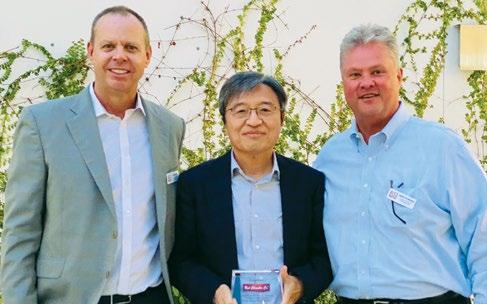
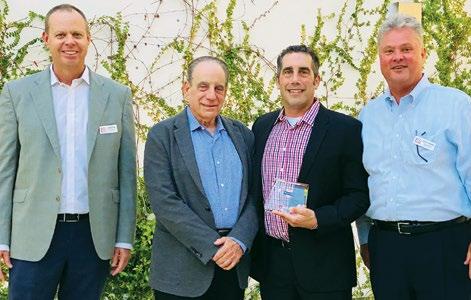



ike many companies, supply chains are operating amid a myriad of unprecedented challenges. And never before has communication, alignment and flexibility among stakeholders – procurement leaders, restaurant operators, distributors and suppliers – been so critical to sustaining a flow of products.
At RSI, we recognize that our success is shared and value the contributions of those who play integral roles in helping us deliver on our mission of ensuring supply for BURGER KING® restaurants every day. In the same way our business partners have continuously elevated their support, we too are committed to expanding our appreciation efforts, beginning with our supplier community: a group that has remained agile and innovative to help us react swiftly to daily challenges – a feat accomplished only through close collaboration.
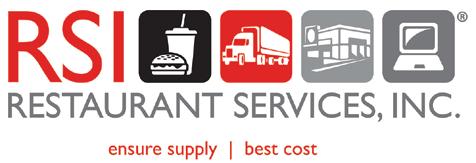
“The current climate has forced suppliers to make difficult decisions, including prioritizing customers to meet demand. Together with our business partners, we have ensured that the BURGER KING business remains a top priority, helping us minimize disruptions and keep restaurants operational when others in our industry could not,” said John Sutton, vice president of purchasing at RSI. “The importance of developing and maintaining strong business relationships has been woven into the fabric of our company over the past 30 years and, as one of the cornerstones of our success, fostering these partnerships will remain a key focus for RSI.”
As a new initiative in its ongoing effort to honor the power of partnership, RSI will host annual supplier dinners in cities across the U.S. in conjunction with one of its board of directors’ meetings, the first of which took place during the August
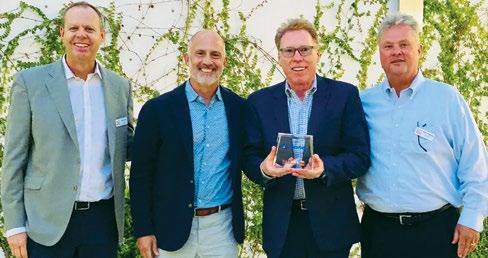

meeting in Los Angeles. RSI President and CEO Joel Neikirk, RSI board members and RSI officers dined with local leaders representing several BURGER KING brand suppliers and extended the company’s appreciation.
Building upon our foundation of trust, transparency and collaborative relationships, RSI is committed to maximizing opportunities to recognize the valuable contributions of our supply chain partners, further cementing our collective success.
40 | 2021 ISSUE 3
n
1 2 3 4 5 6 L
RSI Vice President of Food & Packaging John Sutton and RSI Chair Jerry Fitzpatrick thanked members of the BK supply chain community for their work keeping the system supplied over the last year. 1. From left, Sutton, Deena Conner and Lina Hu of Clipper, and Fitzpatrick. 2. From left, Sutton, Todd Cooper and Jack Moore of Smithfield, and Fitzpatrick. 3. From left, Sutton, Luis Andrade and Jim Goggin of Ventura Foods, and Fitzpatrick. 4. From left, Hugues Labreque of Bonduelle, Sutton, Jeff Herdeg of Bonduelle and Fitzpatrick. 5. From left, Sutton, Ming Shin of Red Chamber and Fitzpatrick. 6. From left, Sutton, John Freund and Steven Freund of Freund, and Fitzpatrick.






Connecting You to Your Restaurants at the Touch of a Button Providing a 360-degree view of your company's performance for a single restaurant or restaurant groups -► GETITON Google Play Questions? Call the RSI Help Desk Phone: 305.529.2123 or Email: helpdesk@rsilink.com BURGER KING® System Supply Chain Management & Distribution Cooperative RESTAURANT SERVICES, INC. 5200 Blue Lagoon Drive, Suite 300, Miami, Florida 33126 • Phone: 305.529.3400 • Fax: 305.529.3440 • Web: www.rsiweb.com
BURGER KING Family Fund: A Helping Hand in Times of Need

With hurricane season in full swing and the COVID-19 pandemic still raging across the country, the BKSM Family Fund continues to stand ready to help our employees during emergency situations. The BKSM Family Fund is often our employees’ first line of defense to help them get back on their feet and recover after a tragedy. Since 2004 we have been devoted to assisting our BK® family, helping over 1,700 employees with over $2.4 million in relief grants.

We’d like to share just two of the countless employee stories we’ve received. One employee from Texas lost both of her parents to COVID-19, then contracted the virus herself. She was fortunate enough to go home after a couple of days in the hospital but had to remain quarantined during her recovery. Although we could not begin to ease the emotional pain the family experienced after losing parents and grandparents, the BKSM Family Fund was able to ease the financial burden by helping with funeral and hospital bills. In another tragic event, an employee from Mississippi lost her home and all her belongings after a tornado ravaged her town. The BKSM Family Fund helped cover the costs to put a roof over her head again.
More than 100 families affected by COVID-19 have been awarded grants since the start of the pandemic. As the number of cases continues to rise due to new variants, we expect to see more applications. Your donations at a time like this make it possible for us to lift our employees during their suffering. Please consider donating at www.bkmclamorefoundation.org/donate/ to help our employees in need.
Your donation can make a life-changing impact in the lives of BK® employees. Every dollar makes a difference!
• $60 can feed an employee for a week.
• $500 can cover a deductible or help with insurance costs
from a hospital visit.
• $4,500 assists us in providing a full grant or three-plus emergency grants.
Employees in need of immediate short-term aid can apply for a grant from the BKSM Family Fund at www.familyfund.bk.com. Please note that a sponsor and appropriate evidence is required. We encourage you to share this information with your employees


and let them know about our emergency relief grant program. If you have any questions about the application process, please email Maria Toscano at mtoscano@rbi.com.
In these uncertain times, please consider making a difference by lending a helping hand to your BURGER KING® family when they need it most. n
42 | 2021 ISSUE 3
The BK Family Fund helped one BURGER KING team member in Mississippi recover from a tornado.


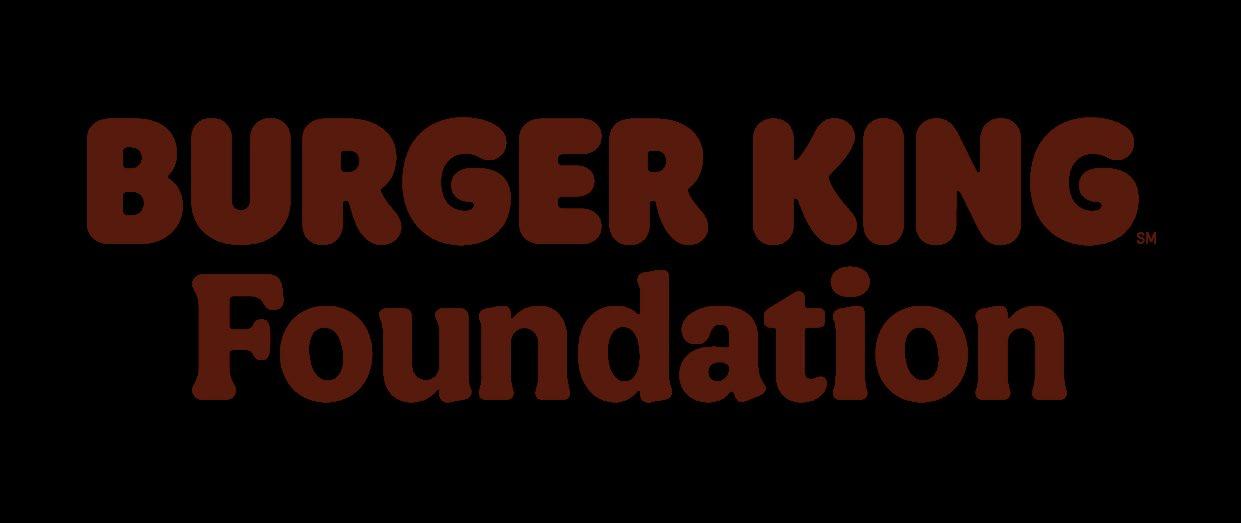



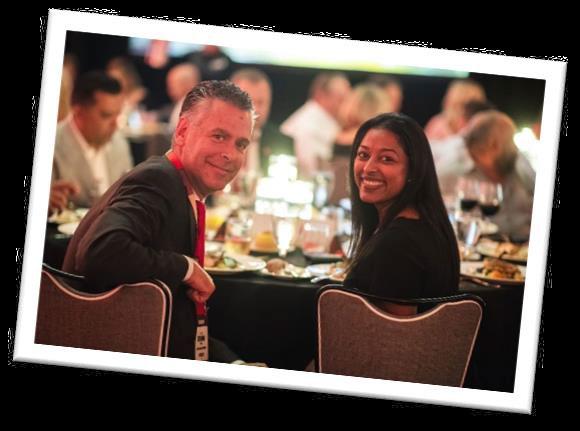
2021 ISSUE 3 | 43
TIME’S RUNNING OUT: Plan Now for ASC 842 Lease Standard Compliance


After a one-year deferral due to the pandemic, the ASC 842 lease accounting standard takes effect for private companies at the end of this year. So yes, there’s another deadline – and this time, thank the accountants. This new standard published by the Financial Accounting Standards Board requires companies to track and disclose all lease obligations more consistently in their financial statements, including commercial real estate leases.
In a nutshell, ASC 842 requires tenant operators to bring most leases onto the balance sheet. So instead of just having a rent expense on your P&L and then subsequently on the balance sheet as a monthly deferred amount, you’ll need to show the entire lease obligation for the duration of the lease term as an asset and a liability valued at the net present value. That’s a huge number if you look at the total future payments of all your real estate leases, and it involves a series of complex conditions and calculations that may be daunting to your team.

deferred rent so you would start to get some visibility – some normalcy. With that same theoretical five-year lease under ASC 842, companies now need to apply a present value calculation, either the risk-free treasury rate or your cost of debt, and recognize that full asset and liability. There’s a series of tests to be applied to each lease for validation. From there, the monthly effort from your accounting team can be costly, because you need to start the amortization of the lease payments, effectively breaking out the short- and long-term liabilities.
There’s a lot of effort behind the scenes to get this right the first time – and it’s essential to start now. To assist BURGER KING® franchisees, Leasecake is offering a no-cost consultation to FLAME readers with our in-house CPAs. You can contact Taj Adhav at taj@leasecake.com to schedule yours.
If you want to get a head start, there are a series of steps that are consistent for anyone adopting the new standard:
This new standard is a significant
and important change for practically every lessee business owner. The main reason is that this is what accountants do – ensure consistency in comparing financial statements that reflects the substance of the business operations. Simply reflecting a monthly cash payment and rent expense doesn’t show the complete picture of the full lease term obligation, also referred to as a liability. Simultaneously, an “asset” is recorded because operators have the right to use a location for the duration of the lease. Accurately showing the full liability and simultaneous asset allows lenders, investors, buyers and sellers to easily compare financial statements across companies. Complying with ASC 842 provides a much clearer financial picture of the entire lease portfolio payment obligation, rather than just showing the current year rent expense and payment, which is how it all began.
Previously, it was simply a credit to cash. You wrote a check for your lease payment, and you recorded it as a rent expense. Then came the prior standard of ASC 840, which evolved into requiring that off-balance-sheet obligations be recorded into a system that provided a little bit of visibility.
If you had a five-year lease with rent bumps, ASC 840 drove a straight-line calculation. You took the total amount of those 60 months, including the rent increases, and divided it evenly. You booked your cash payment and your rent expense over time, but it created
1. Create a lease inventory.
2. Review current system and tech needs.
3. Test sample agreements.
4. Conduct an embedded lease search.
5. Train accounting management and leasing team.
6. Standardize disclosures and provide them to management.
7. Choose your adoption date.
Preparing for ASC 842 might seem daunting. Based on the public companies that didn’t manage the transition so smoothly, that’s a valid concern. But like any big project, it’s all about getting started and planning out the steps. Just don’t ignore the looming deadline until it’s too late. The sooner you start and the more thorough you are, the better off you’ll be.
Taj Adhav was a CPA for 15 years, with experience in the Big Four, and is now the founder and CEO of Leasecake, a location-management platform for tenants, landlords and brokers who operate multiple locations with a distributed team. If you’re interested in a free ASC 842 consultation, contact him at taj@leasecake.com. n
44 | 2021 ISSUE 3 2021
Leasecake is a Sapphire partner member of the National Franchisee Association. The company may be reached at 407-595-6056 or www.leasecake.com.
Meet With Attorneys From the Nation’s Top Franchise Law Firms at the 2021 CFA Legal Symposium
The CFA Legal Symposium was established to help franchisees meet with the country’s top franchise attorneys and discuss pressing legal issues. Because NFA is a member of the Coalition of Franchisee Associations (CFA), all NFA members are invited to this must-attend event immediately following the Restaurant Finance and Development Conference. Registration is free!
The 2021 CFA Legal Symposium is Nov. 10-11, at the Bellagio in Las Vegas. Franchisees will discuss a variety of legal topics associated with buying, owning and operating a franchise, both as a group and one-on-one.

Topics include:
• COVID-19 Compliance
• Encroachment

• Third-Party Delivery Systems
… and many more!
To learn more about the event and to register for free, visit www.thecfainc.com/events/cfa-legal-symposium/.
TraitSet

Recruiting Tools

Consumers are more than ready to return to dining. This is your opportunity to create sweet, memorable mo-mints.
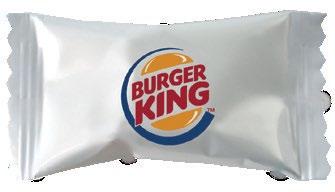
End every meal with the hospitality only a complimentary mint and sanitizer can offer. Our products are personable, customizable marketing tools to share your brand with your patrons.

To create mo-mints that last, visit hospitalitymints.com

What a BOP Does and Doesn’t Cover
Restaurant customers often order a combo meal, since it has everything most people need – entrée, side and drink. Packaging a burger, fries and a soda into a combo meal makes a lot of sense, and it’s like how a Business Owners Policy (BOP) works in insurance.
What Is Included With a BOP?
A BOP insurance package offers several types of insurance rolled into one. Most BOPs include policy coverage for:
• Property Insurance: This is coverage for your business’s buildings and contents against damage and theft. This coverage applies whether you lease, rent or own your building.
BOP property coverage also takes care of the contents of your buildings, such as physical inventory, furniture, equipment, vehicles, cash or digital assets such as customer data. A standard BOP will cover named perils, such as fire, wind, hail, vandalism and theft.
• Business Interruption Insurance: This coverage can help protect your business in the event of a fire or other serious catastrophe that interrupts the operations of your business.
Business Interruption Insurance can cover the loss of income

resulting from a business interruption and help with other related expenses, such as operating out of a temporary location.
• General Liability Insurance: This covers your business’s legal responsibility for damages it may cause to others, for things you or your employees do or fail to do as part of business operations.

General Liability includes coverage for medical bills for a customer’s accident or injury as well as damage that happens to a customer’s property. Coverage also extends to cover certain legal fees, court costs, and judgments or settlements resulting from damages your business is claimed to have caused others.
BOPs can offer other additional insurance as an easy add-on. In sum, this combo of policies can protect your business from a wide range of risks typical of your industry.
What Is Not Covered by a BOP?
A BOP is a package of the most common and useful policy coverages in your industry, but it’s not everything on the menu. For some businesses, a BOP may be all you need. But many restaurant businesses will need additional protection, as most BOPs do not include the following policies:
46 | 2021 ISSUE 3
• Workers’ Compensation
• Employment Practices Liability

• Commercial Auto
• Cyber Liability
Who Needs a BOP?
While not all businesses need the kind of packaged coverage a BOP offers, many do. In general, your business needs a BOP if your business:
• Is small to medium sized.
• Maintains a physical address.
• Has assets at risk of damage or theft.

• Faces the risk of being sued.
What Is the Advantage of a BOP?
A BOP insurance package offers several advantages for restaurant businesses like yours.
Convenience: A BOP is a convenient way of buying insurance. Getting coverage for your business can be confusing and stressful enough without having to pick out all the right coverage à la carte.

Cost savings: A BOP can save most people money on their coverage. That’s because the package is designed so that coverage doesn’t overlap, eliminating the likelihood that you will pay for the same thing twice.
Broad protection: A BOP can help ensure you have all the standard coverage you need. You won’t be risking coverage gaps and exposures that are possible when you combine generalized stand-alone policies.
Industry specific: A BOP is often a better choice for small- and medium-sized businesses in a particular industry. Every
industry has unique risks that a BOP policy is specifically designed to protect against.
A BOP is consistently one of the most popular insurance policies available for restaurant businesses. It’s a quick and easy way to get the standard industry coverage and limits your business needs in one convenient package. For businesses with property and liability risks, it’s the smart choice. While a BOP combo doesn’t include all the insurance products you may need, it’s a great starting point for key property, liability and business interruption coverage.
If you have questions about a BOP for your business or other insurance needs, co-brokers Lockton Affinity and Elevanta have you covered. Visit Elevanta.LocktonAffinity.com to learn more.
The Elevanta Insurance Program is administered by Lockton Affinity, LLC d/b/a Lockton Affinity Insurance Brokers LLC in California #0795478. Coverage is subject to actual policy terms and conditions. Policy benefits are the sole responsibility of the issuing insurance company. Coverage may be provided by an excess/surplus lines insurer which is not licensed by or subject to the supervision of the insurance department of your state of residence. Policy coverage forms and rates are not subject to regulation by the insurance department of your state of residence. Excess/Surplus lines insurers do not generally participate in state guaranty funds and therefore insureds are not protected by such funds in the event of the insurer’s insolvency. Elevanta will receive a royalty fee for the licensing of its name and trademarks as part of the insurance program offered to the extent permitted by applicable law.

2021 ISSUE 3 | 47
n
The Political Divide At Work: What To Do About It

In a time when the choice to wear a face mask is considered by many to be a political statement to be cheered or jeered, it is natural to wonder how a business can survive the growing, deepening political polarization plaguing the workplace and seemingly all aspects of our lives.
Indeed, you might even be wishing for the “good old days” when we, as a nation, were reportedly not so politically divided. Wouldn’t that be nice? Unfortunately, it is hard to find any time in our nation when there was not a political divide. Indeed, if you go back to our nation’s founding fathers and the presidential election following George Washington’s terms, there is ample evidence of partisan politics: Thomas Jefferson described his opponent John Adams as being “a blind, bald, crippled, toothless man [with] a hideous hermaphroditic character with neither the force and fitness of a man, nor the gentleness and sensibility of a woman.”
You do not have to look up the definition of “hermaphroditic” (I did) to understand that this is a take-no-prisoners insult that was generally, undeniably false. (While on his way to being bald, Adams was indisputably not disabled, toothless or blind, with the rest being either subject to debate or lost to history.)
This is hardly the only example of deep, partisan disputes through history, but certainly establishes that our young nation’s
political discourse was hardly genteel.
Although our history reflects deep partisan divide and debate, this does not diminish the negative impact it can have on the modern workplace. Political debate can impact morale and productivity in both obvious and hidden ways, for example, through co-workers who refuse to work with each other because of a political disagreement. In some instances, the debate can spill over into customer relations.
by DOUGLAS H. DUERR
Indeed, that politics impacts work is not supported just from anecdotal evidence, but was recently confirmed (as if there was any debate) in a recent report by the research and advisory firm Gartner Inc.:


• 78% of employees report discussing politics at work.
• 47% of employees claim the 2020 U.S. presidential election impacted their ability to get work done.
• 36% of employees reported they avoid talking to a co-worker because of the 2020 election.
• 31% of employees who talk politics at work report these conversations as stressful and/or frustrating.
So, you know it’s happening and that it’s causing problems at
48 | 2021 ISSUE 3
work, but what can you do about it? Ignore it?

While perhaps tempting, as the Gartner report shows, letting it happen is going to have a negative impact on your workplace, with the inevitable negative impact on financial results. In addition, ignoring it can have legal implications, and not just in the handful of states that prohibit discrimination at work due to political activity and views.

For example, a supervisor’s offhand comment on a “political issue,” such as about sports stars taking a knee during the singing of the national anthem, could be perceived as racially insensitive. Or, what if a supervisor rebukes an employee for supporting such athletes? Is that a basis for a claim of retaliation for raising issues of racial discrimination/inequity? Perhaps.
While it can be hard sometimes to recognize when something has become a political issue (e.g., whether to get a vaccine or wear a face mask), it is important to stay on top of the issues to be sensitive to whether it is one of mere party politics (e.g., Democrat vs. Republican) as opposed to something protected in the workplace (e.g., race, LGBTQIA+, etc.). This is not just something about which top management needs to be aware. Supervisors must also understand the importance of not expressing their political views and encouraging employees to focus on less controversial matters.
That type of general guidance, however, is no substitute for a formal program that recognizes politics will be in the workplace. Thus, consider whether you want to publish a policy that provides guidance on what is/is not permitted (e.g., clothing, campaigning for a candidate, etc.) at work.

While such policies can be helpful tools for supervisors trying to enforce workplace harmony, care must be taken to ensure
that the policy does not itself violate state or local law protecting political speech nor federal labor law, which allows employees to discuss (during nonwork times in nonwork areas) matters relating to the terms and conditions of work.

Even if you do not adopt a policy on discussing or engaging in politics at work, you should make sure that managers and supervisors are attuned to this issue and that there is a plan in place when there is a complaint or conflict. Make sure that your anti-bullying rules and harassment programs encompass “political speech” that can become “bullying” or cross the line into harassment based on a protected characteristic (e.g., race, sex, religion, disability, etc.).
Finally, remember, if you have been following this column for any period of time, you already know that fostering and nurturing an inclusive workplace in which every employee, supervisor and manager is respectful to others and their differences goes a long way to having a legally compliant workplace. When it comes to politics, as with other differences, it is important that everyone remains respectful on this point as well.


Partisan politics have been around for a long time and are not going away any time soon. As such, being mindful of its presence and potential impact on the workplace is the first step to having a plan in place to deal with it. Do not wait until it is too late. n
DOUGLAS H. DUERR is a partner at Elarbee Thompson, a national labor and employment law firm with an industry practice area focused on franchisees. Learn more at www.elarbeethompson.com.
2021 ISSUE 3 | 49 PEOPLE FIRST, WINNING TOGETHER At Restaurant Technologies, our team is 100% dedicated to supporting Burger King franchisees in achieving your business goals with our back-of-house solutions. Whether automating oil management or hood cleaning, together we work to help you improve operational efficiencies and productivity, while delivering better restaurant profitability. www.rti-inc.com | 888-796-4997 Scan the QR code on your phone to learn more about innovative solutions for Burger King. New Program Pricing Now Available for Burger King Franchisees! Everything good begins with a seed. A market-leading lineup of relevant, delicious foods you can trust—all backed by over 80 years of proven foodservice expertise. simplotfoods.com © 2017 J.R. Simplot Company
Influence People to Stay on the Path
Ithink one of the most important aspects of leadership is mundane leadership.
In the Merriam-Webster dictionary, mundane means to be characterized by the practical and ordinary. Mundane is incredibly hard to maintain. It takes relentless focus to be mundane. It requires a mountain of strength to be consistent day after day for decades. And that is where greatness comes into play.

Keep Your Purpose and Values Clear, Constant and Up Front all the Time
You are a leader. You have brought together a fellowship around an important purpose and clear values with your eyes set as an organization on achieving important outcomes. You see the path that you need to stay on, and it consists of your purpose and your

50 | 2021 ISSUE 3
values. The activities along the way will likely change but sticking to the path is the key to achieving those great goals.
values, your purpose, your path. Add team members who buy into that purpose and those values for the long term. The quest to fulfill that purpose is the path you are on. You might do things differently and you might do different things on that quest but don’t allow yourself or your team to give up the purpose and the values too easily for something that seems more exciting. That’s the pattern for never achieving anything great.
by DAN COUGHLIN
My parents went on a quest starting in 1955 when they got married. They wanted all their children to be well educated. They wanted all of them to get a college degree. They stayed focused on that quest for 36 years until their sixth child got her college degree in 1991. They talked about this quest over and over and over again.
You got the team excited. People are pulling together and supporting each other. Things are happening. Results are being achieved.
But then boredom sets in with the daily routine. Jealousy and egos rear their ugly heads. Other pastures look greener. Other purposes and values seem more cutting-edge and exciting. There is an enormous temptation to jump and try something else.
Sam Walton, Oprah Winfrey, Ralph Lauren, Steve Jobs, Mother Teresa, Warren Buffett, Walt Disney.
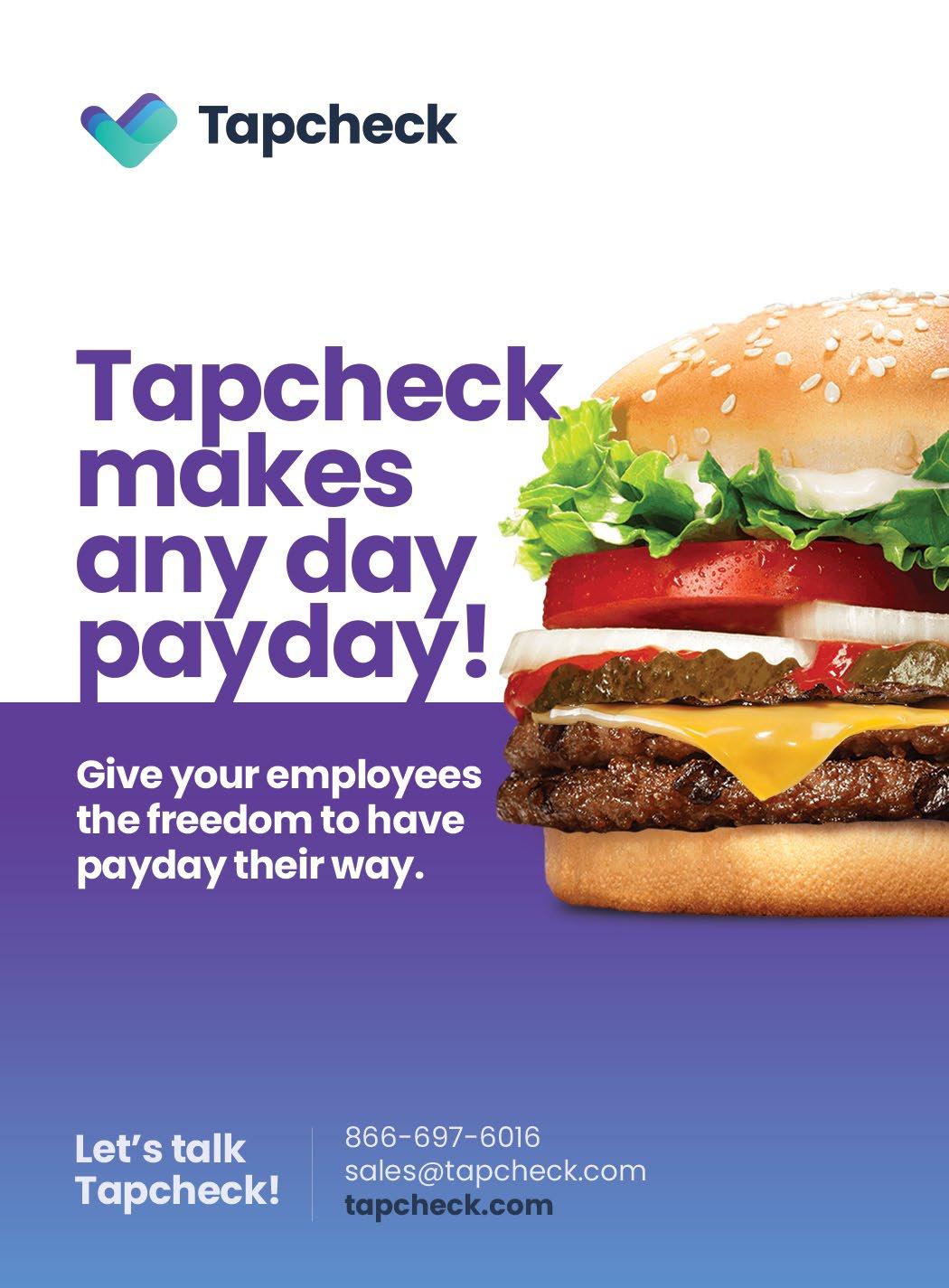

They all stayed the course. They stayed focused.
They did different things, but they never left their path, their purpose and their values. They tried different ways to achieve great outcomes, but they always stayed within a given purpose and a given set of values.
Don’t lose your focus. Start with yourself. Stay true to your
In your work, clarify the quest, the purpose you want to fulfill individually and collectively, and the values that will drive behaviors in your team. Then obsess over that purpose and those values. Talk about them consistently week after week. Don’t allow yourself or other people to jump off that path and fall in love with a flavor-of-the-month purpose or catchy values that other companies are talking about.
Your path consists of your purpose and your values. Your plan consists of activities. Your activities can change. That’s understandable. But don’t allow your path to change. n

DAN COUGHLIN provides both individual and executive coaching and group coaching programs on management, leadership and teamwork. To visit his free Business Performance Idea Center, go to www.thecoughlincompany.com.



2021 ISSUE 3 | 51 SCAN THIS QR CODE TO RECEIVE THIS OFFER ON YOUR SMARTPHONE YEAR-ROUND ON SKECHERS SLIP-RESISTANT WORK STYLES SHOP ONLINE AT: www.skechers.com/direct/burger-king No promo codes needed. Just shop and save! Show this ad when shopping at our SKECHERS retail stores nationwide or mention RETAIL CODE: RX MORE THAN JUST WORK SHOES CORPORATE SHOE PROGRAM
In your work, clarify the quest, the purpose you want to fulfill individually and collectively, and the values that will drive behaviors in your team.
Everything Speaks About Your Business.
What Does It Say? What Does It Say?
One of the customer service principles I focus on a lot is the principle that “Everything Speaks.” If you’ve read any of my writings or sat in on one of my presentations, you’ve likely heard me harp on this subject, meaning that every detail of the customer experience either enhances your brand or detracts from your brand. Your brand can refer to your organization’s brand, your department’s brand or your own personal brand. Everything speaks.
I’m always looking for examples of this principle in action. I had a recent experience that perfectly highlights what Everything Speaks means.
The fabric liner in my car’s roof had some damage and needed to be replaced. The dealership where I bought the car doesn’t do that type of work and recommended a local company to do it. I have a good relationship with the dealer, so I trusted the recommendation.
When I arrived at the shop, I was taken aback by the messiness of the reception area. There was a strong sense of disorganization. But what really jumped out was the condition of the chair I sat in as I discussed the repair issue. The chair’s fabric was worn and torn in spots.
Keep in mind that this company specializes in fabric repair. So, there was a strong disconnect between the quality of work that was being promised and what I was experiencing in real time. Everything Speaks.

 by DENNIS SNOW
by DENNIS SNOW
You might be wondering if I gave up on doing business with the shop or if I went ahead with the repair. Well, I did go ahead with the repair mainly because my car dealership recommended the company, and I trust my car dealership. And the shop did a fine job with the work. But here’s the point – I went ahead with the

52 | 2021 ISSUE 3
work IN SPITE of what I was experiencing, not because of what I was experiencing. That’s not a very good place for a company to start from. I could have just as easily turned around and looked for another company to do the work.

otherwise have had.
So, what do I recommend? During a team meeting come up with at least 10 potential Everything Speaks distracters – physical and attitudinal. You might even walk through your customer areas during this discussion. Then, come up with commitments for each of the potential distracters so that they don’t occur.



The employees of the repair shop discussed earlier might commit to everyone making sure the reception area reflects the quality of work they do and projects an image of trust.
A help line’s employees might commit to talking to every caller in a way that says they’re present and eager to help. They could brainstorm ways to project that eagerness.
Ultimately, when the Everything Speaks philosophy is truly embraced, your brand image benefits, your department’s image benefits and your own image benefits. What more could you ask for?

On the other hand, the parts and service area of the dealership I mentioned earlier is pristine. It practically screams competence, efficiency and organization. Your first impression of the place is positive and trust-building. Not a bad impression for a company to make when you’re dropping off a vehicle for a potentially costly repair. Again, Everything Speaks.
One other thought on the subject: There’s also what I call “attitudinal” Everything Speaks. We’ve all talked to a help-line agent who we could tell just by the tone of his or her voice didn’t really want to help us. They just go through the motions, often reading from a script. Everything about their approach says they just want to finish with you and get on to the next call. Everything Speaks, and this type of interaction diminishes any trust we might

Here’s something to think about: Because Everything Speaks, what are the physical and attitudinal details saying about you and your organization? n



DENNIS SNOW is the president of Snow & Associates Inc. Dennis worked with The Walt Disney Co. for 20 years and now consults with organizations around the world, helping them achieve their customer service goals. He is the author of “Unleashing Excellence: The Complete Guide to Ultimate Customer Service” and “Lessons From the Mouse: A Guide for Applying Disney World’s Secrets of Success to Your Organization, Your Career, and Your Life.” You can reach Snow at 407-294-1855 or visit his website at www.snowassociates.com.

2021 ISSUE 3 | 53
Every detail of the customer experience either enhances your brand or detracts from your brand. Everything speaks.
Post-COVID-19 Productivity: Five Ways It’s Going to Improve Our Performance

have gotten much done. The consensus is that these and other new business methods promise to revolutionize post-COVID-19 productivity as things normalize.


Let’s look at a few things the business world has adopted that promise good things to come:
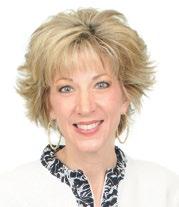
While we may be premature in assuming that the worst of the COVID-19 pandemic has passed with the delta variant alive and well, it’s better than it was a year ago. However, things will never be the same in its wake, even for those of us untouched by the disease itself. Our new attitudes about social distancing, personal protection and hygiene will remain for a long time, as will practices adopted in all aspects of our lives.
Among other things, we’re still weathering the worst recession since the Great Depression, when so many of us were laid off, furloughed or otherwise out of work due to lockdowns. Now that we’re piecing together the shuttered and shattered portions of our economy, we’re also putting into action various things we’ve learned to get anything done at all.
More than anything else, remote technology saved us from financial and business ruin. During the last major pandemic, the Spanish Flu of 1918-1919, our ancestors managed without it, because they still depended on simpler lifestyles. But in the intervening century, we’ve become so dependent on high-tech and machines that we could barely function as coherent centralized organizations during the pandemic. Without telephony and its offshoots, we couldn’t
by LAURA STACK
1. Less business travel. This was forced upon us as airlines and other carriers either shut down or drastically cut back. Suddenly, it became nearly impossible to have face-to-face meetings with clients or co-workers across the country or world. Face time – if needed – was usually possible using Skype, Zoom and other software apps. If not, good old phone-based telecoms sufficed. We proved to ourselves we don’t need as much business travel. If we can hold to this lesson, we can’t help but become more productive and profitable.
2. Telework/remote work became more acceptable all the way around. Management and rank-and-file alike became more comfortable with it, because again, it was forced on us by circumstance. No more Neanderthal thinking that if I can’t see you, you can’t be working. Those who had never embraced remote work, as so many others already had, learned how useful it was and stopped worrying so much about workers skiving off just because they weren’t under the watchful eyes of their managers. If everyone remains as comfortable as the
54 | 2021 ISSUE 3
“Smooth seas do not make skillful sailors.”
– African proverb
technology advances, productivity will continue to rise based on what we’ve learned.
3. Digitization, automation and AI have become better and entrenched in the workplace. Like most pundits, I don’t see this changing. These aren’t the kinds of innovations that will replace people; they’ll make those people more productive since they don’t need to worry so much about the day-to-day “housekeeping” of their workplace, whether that means compiling daily reports or filing paperwork.
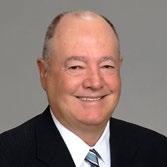

4. Many organizations have restructured their workforce more efficiently. They were obliged by social distancing and remote working to create efficient long-distance ways of doing things, especially during downtime after layoffs. Sometimes this meant laying off or letting go of their least productive workers so they might become more efficient and agile. If these improvements aren’t dropped as COVID-19 goes away, they’ll pay more productivity dividends down the line.
5. Hardships strengthened surviving businesses. To survive, most had no choice but to innovate. Many of those innovations will continue to pay off in coming years. At the very least, the situation caused them to create new contingency plans to cover everything, preparing them in more ways for the future.
Toward the Future
One thing COVID-19 has required of us is the adoption and serious use of technology that futurists and science fiction writers
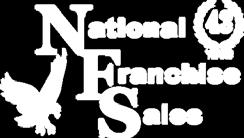

expected us to adopt long ago, but that businesses have heretofore avoided. Why this occurred isn’t entirely clear. Part of it was cultural inertia; when things work well enough, why change? I suspect many people also avoided remote technology due to fear of a presumed dehumanizing influence. Fortunately, it didn’t turn out that way; once we overcame a few technical obstacles, it allowed us to work effectively and brought us closer together. A glance at prime time TV commercials reveals that new telework and remote digital products are still being rolled out and pushed heavily, though most of us can gather in public once again – and e-commerce is booming. Bottom line, the business world’s response to COVID-19 has helped personal productivity. We’ll see how it sticks. n
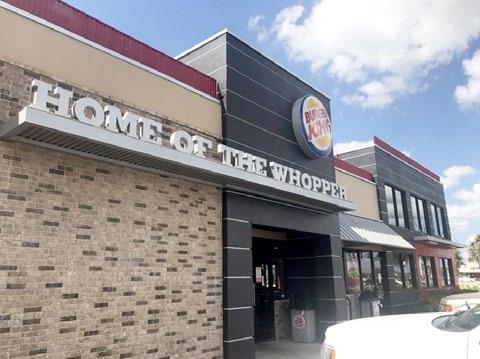

tners
Tyson Foods is proud to partner with Burger King® for menu breakthroughs like the new Hand-Breaded Crispy Chicken Sandwich and Chicken Fries. As one of the world’s largest protein producers, it’s an honor to team up with the Burger King® system supplying products made with clean ingredients including tacos, chicken, tortillas and more plus innovation along the way.


LAURA STACK, MBA, CSP, CPAE, is an award-winning keynote speaker, bestselling author, and noted authority on employee and team productivity. She is the president of The Productivity Pro Inc., a company dedicated to helping leaders increase workplace performance in high-stress environments. Stack has authored eight books, including “FASTER TOGETHER: Accelerating Your Team’s Productivity” (Berrett-Koehler 2018). She is a past president of the National Speakers Association, and a member of its exclusive Speaker Hall of Fame (with fewer than 175 members worldwide). Stack’s clients include Cisco Systems, Walmart and Bank of America, and she has been featured on the CBS Early Show and CNN and in The New York Times. To have her speak at an upcoming meeting or event, visit www.TheProductivityPro.com.
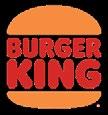
2021 ISSUE 3 | 55
©2021 Tyson Foods, Inc. All other trademarks and registered trademarks are owned by their respective owners.
e x p e r i e n c e m a t t e r s w w w n a t i o n a l f r a n c h i s e s a l e s c o m SOLD! m d @ n a t i o n a l f r a n c h i s e s a l e s c o m m i k e d e e g a n 9 4 9 4 2 8 0 4 9 2 Specializing in Franchise Acquisitions & Divestitures
-sized Par
featuring Clean ingredients.



56 | 2021 ISSUE 3 DIRECTORY 2022 Day on the Hill 25 2022 LEAD Conference 3 Acrelec America 23 412-537-6577 bksmartstore@acrelec.com Allen Industries 27 800-976-2553 BK@allenindustries.com Atmosphere TV 27 512-947-5789 Joey.Martinez@atmosphere.tv BURGER KINGSM Foundation 43 bkaplan@rbi.com www.bkmclamorefoundation.org/donate/ Comcast Business 19 267-283-8261 RBI_Group@Comcast.com Cummings Resources 53 sales@cummingssigns.com cummingssigns.com DTiQ 30 800-933-8388 www.dtiq.com/burgerking/ Ecolab 29 800-529-5458 www.ecolab.com Envysion 33 303-725-1751 Envysion.com/flame Elevanta Health 5 678-797-5160 elevantahealth.com/nfa Global Building Contractors 33 1-800-257-9442 www.gbc.llc Gycor International 17 800-772-0660 www.gycorfilters.com Hall Financial Advisors 35 866-865-4442 www.HallFA.com Integrated Cash Logistics 37 412-906-0720 www.integratedcashlogistics.com Lancer Worldwide 35 904-631-1031 lancerworldwide.com/flame Leasecake 37 407-559-2581 taj@leasecake.com Lockton Affinity IB 844-403-4947 Elevanta.LocktonAffinity.com Keurig Dr Pepper CW, BC 561-236-8123 kelton.graham@kdrp.com Mount Franklin Foods 45 904-923-4053 hospitalitymints.com National Franchise Sales 55 949-428-0492 www.nationalfranchisesales.com Nestlé Waters North America 47 321-863-0944 anitra.miller@waters.nestle.com Northern Bank & Trust 23 781-569-1575 BGardner@NBTC.com Pacific Premier Franchise Capital IF 402-562-1800 ppbifranchise.com rapid! 47 888-828-2270 rapidpaycard.com Restaurant Technologies 49 888-796-4997 www.rti-inc.com RSI 41 305-529-2123 helpdesk@rsilink.com Simplot 49 704-907-6522 simplotfoods.com SKECHERS 51 310-318-3100 x1860 www.skechers.com/direct/burger-king Tapcheck 51 866-697-6016 tapcheck.com The Coca-Cola Co. 15 404-852-5399 skmiller@coca-cola.com The Hershey Co. 53 630-724-7124 hersheyfoodservice.com TraitSet 29, 45 248-470-9100 dave@hrgems.com Tyson Foods 55 410-340-3974 www.tysonfoodservice.com UPshow 39 419-261-1802 info.upshow.tv/burger-king Welbilt 9 813-504-9262 welbilt.com Xenial 34 215-485-0292 BKsales@xenial.com *IF=Inside Front, CW=Cover Wrap, IB=Inside Back, BC=Back Cover
ISSUE AD ARTWORK PUBLICATION DEADLINE DATE 4 Oct. 29 December
, Issue 4 is due out December 2021. We want to highlight any news or events associated with our members. If you have ideas for potential stories, please contact communications@nfabk.org or 678-797-5165 by Oct. 29. Our editorial staff can assist in writing the story for you.
Advertisers Guide 2021 Editorial Calendar
Call for Franchisee News FLAME
Time is money. We’ll save you both. The Elevanta Insurance Program is administered by Lockton Affinity, LLC d/b/a Lockton Affinity Insurance Brokers LLC in California #0795478. Coverage is subject to actual policy terms and conditions. Policy benefits are the sole responsibility of the issuing insurance company. Coverage may be provided by an excess/surplus lines insurer which is not licensed by or subject to the supervision of the insurance department of your state of residence. Policy coverage forms and rates are not subject to regulation by the insurance department of your state of residence. Excess/Surplus lines insurers do not generally participate in state guaranty funds and therefore insureds are not protected by such funds in the event of the insurer’s insolvency. Elevanta will receive a royalty fee for the licensing of its name and trademarks as part of the insurance program offered to the extent permitted by applicable law.

CALL US TODAY! KELTON GRAHAM Vice President 561.236.8123 JOSH HANLEY Team Lead South 770.844.1597 JEFFREY JENRICH Team Lead North 608.318.2661 TRACY KEARNS Team Lead West 951.340.1320 LESLIE McCORMICK Marketing 214.395.3539 DR PEPPER is a registered trademark of Dr Pepper/Seven Up, Inc. ©2021 Dr Pepper/Seven Up, Inc. Burger King logo is a trademark of Burger King Corporation. Used with permission. Dr Pepper Inc. is an approved supplier for the Burger King® system. Name a Tastier Trio. We’ll wait.























































































































































